

How to travel safely and responsibly in 2022 and beyond
Wondering how to travel safely during COVID-19? Many of us are longing to travel again, but only if we can do so safely and responsibly.
We’ve put a lot of thought into the safest ways to take a vacation right now. And we plan to continually update this post with safe travel ideas and tips, as travel restrictions change and Coronavirus travel advice evolves.
In this post, we cover: – Safety tips to help you travel again during COVID-19 – Safe trip ideas for 2022 travel in the United States – What to pack for pandemic travel – Places to visit and travel restriction resources by destination
Disclosure: This post contains affiliate links. If you make a purchase through one of our links, we may receive a small commission, at no additional cost to you.
Table of Contents
How to travel safely and responsibly right now
Step one: Follow CDC travel guidelines
You should already know and practice hand washing, physical distancing, and wearing of face coverings in public.
Responsible travel right now also means being as self-contained as possible to avoid unnecessary interactions or depletion of supplies in the communities you enter. For this reason, consider bringing your own food and supplies when possible.
Be sure to research and obey local restrictions, especially when visiting a destination outside of your home community. Infection rates, hospital capacity, and testing vary widely. Some communities may not have adequate resources in case of an outbreak.
Please respect if a city, State, or county is discouraging non-essential travel.
The following travel activities are ranked on a scale of 1 to 10 by infectious disease experts according to risk of exposure to the virus (first number from Fall 2020 * , second italicized numbers for fully vaccinated people as of April 2021 * ):
Low Risk: – Going camping (2, 1 ) – Getting restaurant take-out (2, 1 ) – Pumping gas (2) – Grocery shopping (3, 1.4 ) – Going for a walk with others (3) Moderate risk: – Staying at a hotel for 2 nights (4) – Going to a beach (5) – Swimming (6) High risk: – Eating inside a restaurant (7, 3.6 ) – Playing contact sports (7) – Traveling by plane (7, 2.7 ) – Going to an amusement park (8) – Attending a large event (9) – Going to a bar (9)
Consequently, we’ll focus on local camping road trips and staycations as the best way to travel safely right now .
Safe trip ideas
After researching safe travel ideas during Covid, we came up with three trip recommendations. These trip ideas were chosen because they:
- Avoid exposure to crowds and public spaces in transit
- Allow you to cook your own meals or order take out, like you would at home
- Avoid being in vehicles with others outside your group
- Let you control who and what enters your living space
- Provide access to no-contact activities like hiking, scenic drives, and lounging
1. Take an RV Road Trip
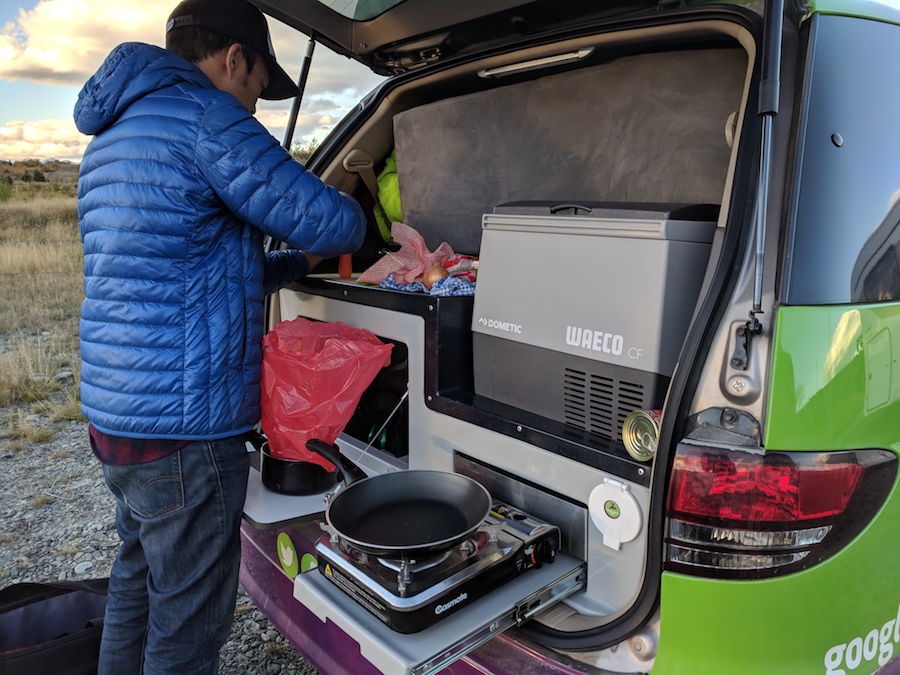
Camping or taking a road trip in an RV allows you to social distance and be self-contained as you travel. With your own kitchen, you have control over what comes in and out of your space, just like at home. And with your own bathroom facilities, you can avoid using public restrooms.
The only difference from staying home vs. a socially distanced RV road trip is that you’ll need to fuel up with gas. By wearing a face mask, watching what you touch at the gas station, and washing hands or using hand sanitizer, this risk can be minimized fairly easily.
Whether you’re driving to reach a destination without airport crowds, or choosing a single stop for a staycation near home, an RV road trip is a great way to get a change of scenery while still maintaining your home safety routines.
Read: How to rent an RV (for beginners)
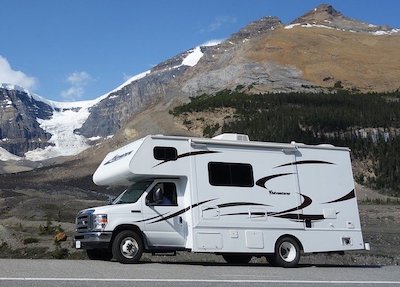
Outdoorsy is like Airbnb for RVs. It’s where RV owners rent out their RVs when they’re not using them.
If you’ve always wanted to try out a motorhome, or want to upgrade your National Parks road trip with a cute Airstream, consider renting through Outdoorsy. Their customer service and reviews have outranked the other top RV rental companies. You can search listings by vehicle type and location. Some owners will even deliver the motorhome to your door! *Take $50 off your Outdoorsy rental with coupon code: intentional
Browse and book RVs, motorhomes, trailers, and campervans on Outdoorsy here
2. Escape with No-Contact Tent Camping
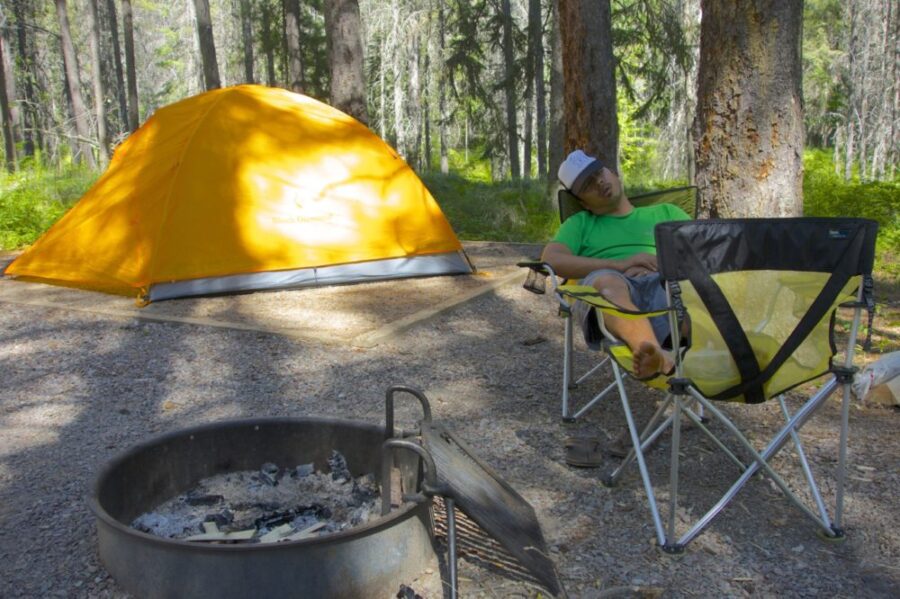
Camping is rated one of the lowest risk travel activities for Coronavirus transmission. Being outdoors with plenty of space not only limits exposure but it’s good for the soul.
With a little prep, you can bring food to cook your own meals. See our camping road trip packing checklist .
But what about using public restrooms when camping? If you don’t have an RV with self-contained bathroom facilities, the essential business of “eliminating waste” becomes your greatest exposure to indoor, pubic facilities where you may need to touch doors, faucets, etc.
By adding a few new camping items, it’s possible to avoid public bathrooms on your camping trip.
See our socially distanced, no-contact camping packing list for the pandemic
3. Staycation in a Vacation Rental
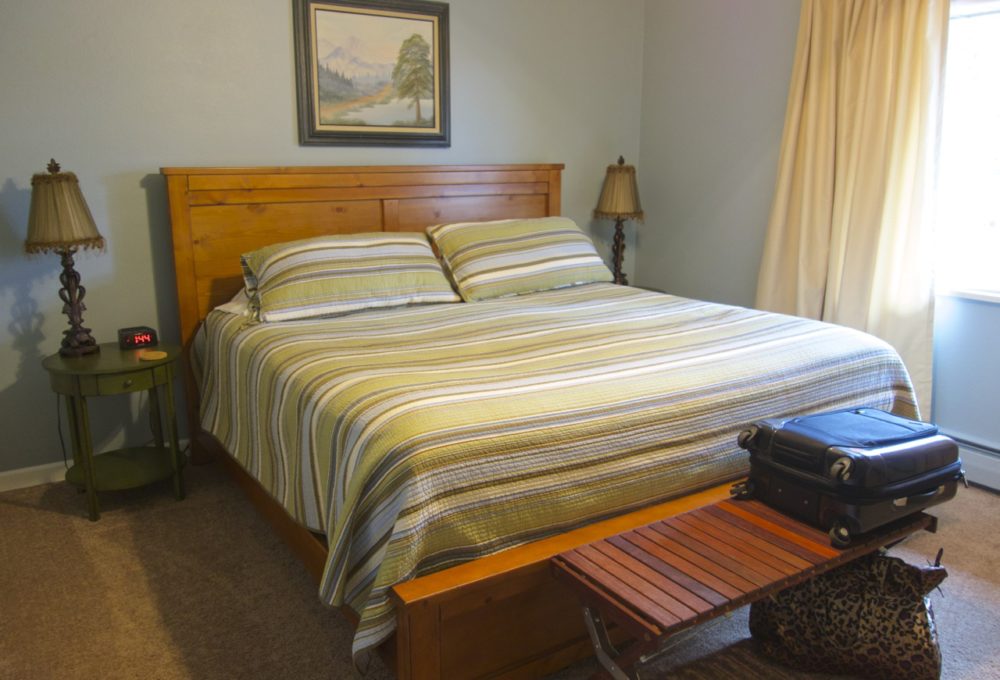
With vacation rentals like Airbnb, you can book an entire guest house or apartment. This way, you can keep similar safety practices that you have at home. For example, you can cook at your vacation home, ordering take out or curbside grocery pick up for meals.
You can book your getaway within driving distance from home, or along the route of a socially distanced road trip. Staying near home is a great way to enjoy a change of scenery while avoiding crowds in airports.
Compared to a hotel stay, you’re like to have fewer interactions with staff or other travelers when renting a vacation home.
Read: What safety precautions to take when renting an Airbnb
What to pack for safe, responsible trips
😷 Face Masks – Cloth face coverings are required in public places. Find N95 masks at Bona Fide > or designer options at Vida >
🧴 Hand sanitizer – Bring enough for your entire trip, as alcohol-based hand sanitizer can be in short supply. Shop hand sanitizer >
💊 Medicine – Bring enough prescription and over-the-counter medication for your entire trip to avoid trips to the clinic.
💳 Vaccine Card Holder – Protect that paper CDC card when traveling abroad (if your country doesn’t offer a digital version). Get a simple plastic protector > or Vegan leather clippable > or Leather passport + card combo holder >
👃 Covid self-test – The most studied rapid antigen self-test with FDA emergency authorization. NOT valid to enter countries. Use for your own peace of mind. Order from CVS > or Walmart >
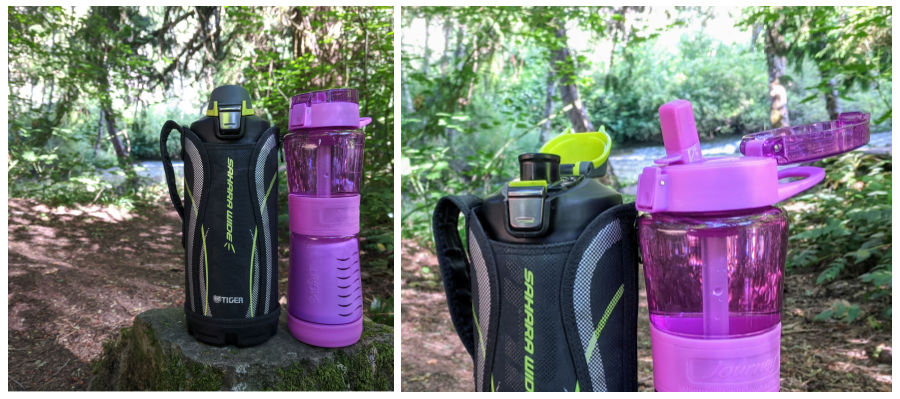
✈️ Travel insurance that covers Covid – We’ve started using Nomad Insurance by Safety Wing for affordable evacuation, international medical, and trip coverage.
Travel restrictions by destination
As travel restrictions change around the world, we’re tracking the travel guidelines for specific destinations in an effort to help you make informed decisions about where to travel and when.
Ecuador travel requirements 2024: What travelers need to know
Vietnam travel requirements 2024: what travelers need to know, japan travel requirements 2024: what travelers need to know, philippines travel requirements 2024: what travelers need to know, thailand travel requirements 2024: what travelers need to know, canada travel requirements 2024: what travelers need to know, hawaii travel requirements 2024: what travelers need to know, italy travel requirements 2024: what travelers need to know, croatia travel requirements 2024: what travelers need to know, jamaica travel requirements 2024: what travelers need to know, merida mexico travel requirements 2024: what travelers need to know, oregon travel requirements 2024: what travelers need to know.
Let us know in the comments below what questions or ideas you have for traveling safely during Covid-19.
Like this post? Pin it for later or share with friends!
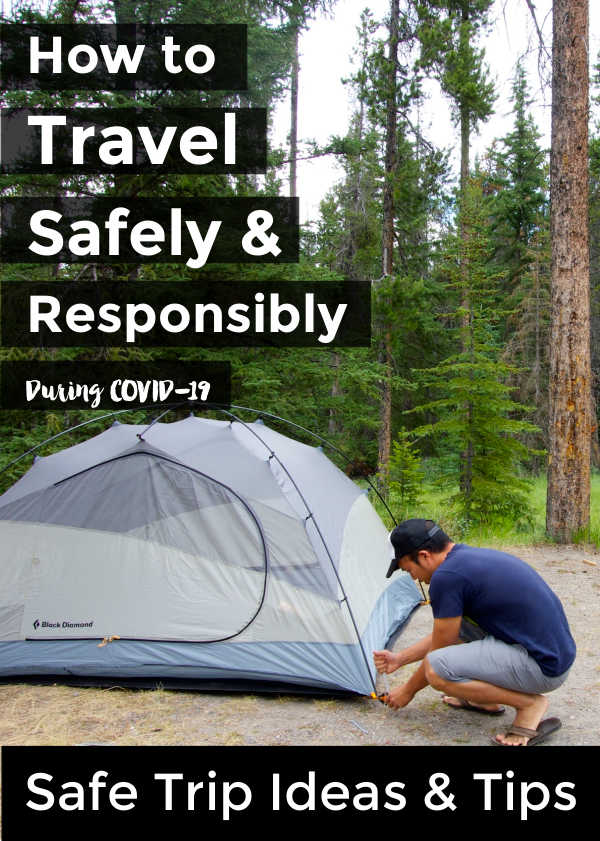
Similar Posts
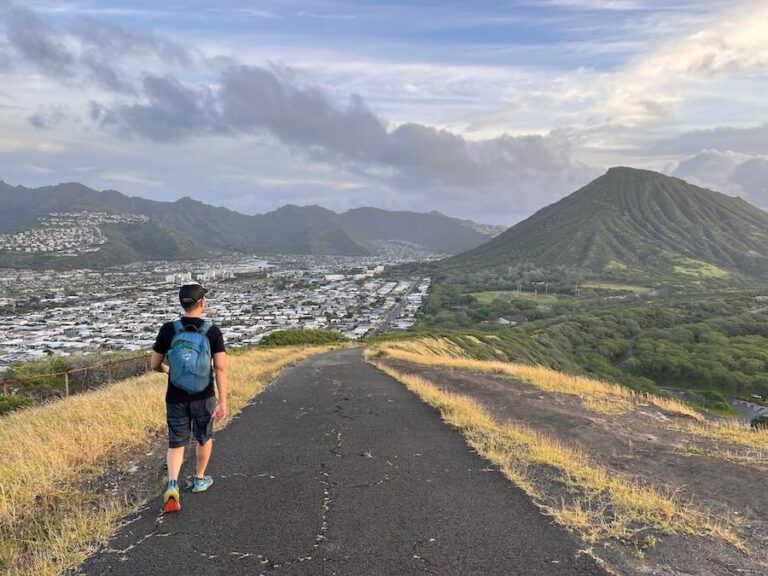
Hanauma Bay Ridge Trail Hike – Oahu, Hawaii
We’ve been hiking in Honolulu for decades but only recently learned about the Hanauma Bay Ridge trail from a cousin. This is an unofficial hike that follows the ridge line above the famous Hana’uma Bay with several scenic views to enjoy. Distance: ~2.5 miles out and back Time: 1 hour Difficulty: Easy Elevation change: ~400ft…

Important Cultural Things to Learn About A Country Before Visiting
We all know cultures are different from each other. But what are those differences? The first time we travel to a new country, we don’t always know what we don’t know. What we may consider “common sense” may not be common – or make much sense – in another culture. By simply acting “naturally,” we…

Inn to Inn Hiking Trips Around the World
Inn to inn (or hut to hut) walking and hiking tours can be a winning arrangement for travelers that love slow travel and active vacations. Walking tours are a chance to see countless new sights without the stressful rush of a typical fast-paced tour. What is an Inn to Inn hiking trip? Updated: 2024. Originally…
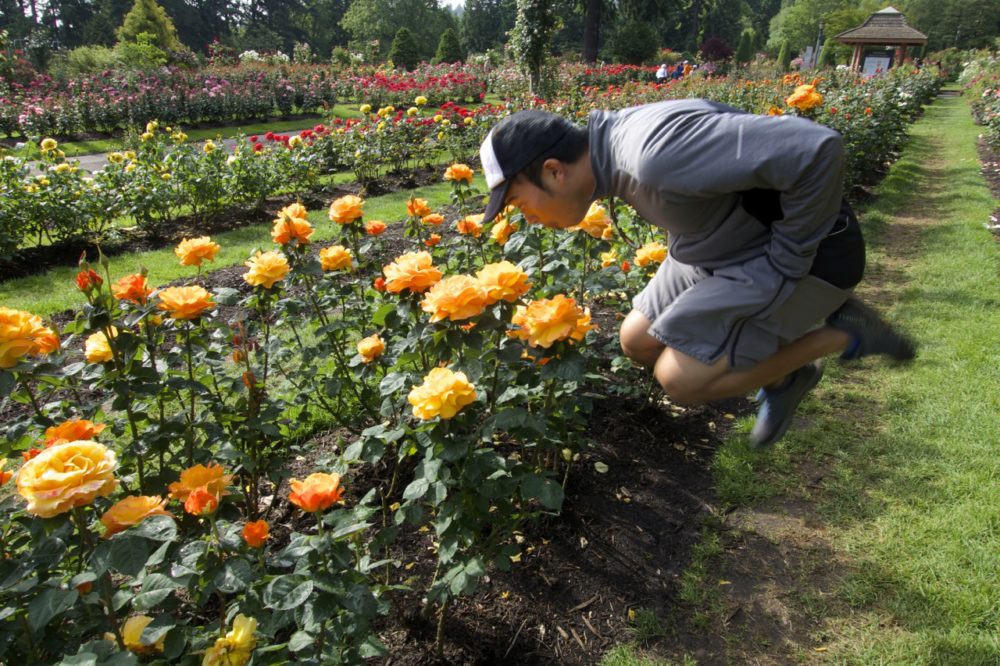
What to Pack for Portland Oregon
Portland has always been a top destination for those who enjoy being in the presence of nature. This quirky city located in the Pacific Northwest has made itself known around the country for unconventionality, environmentalism, and a thriving art and hipster scene. This is complimented by delicious restaurants that any foodie would enjoy. Given the…

Essential Pre-Travel Smartphone Prep Guide
Is your phone ready for your next trip? After a decade of nomad travel in dozens of countries, we’ve narrowed down the essential steps to prepare our smartphones for a trip. These essential pre-travel smartphone tips help us: – arrive in new places with more confidence – handle unexpected issues with more ease – navigate…

Best Donuts in New Orleans: Garden District Food Tour Review
When searching for a New Orleans food walking tour for our stay in the Garden District, I was excited to find the Underground Donut Tour’s Historic Beignet and Donut Tour. Read on for our New Orleans Garden District donut tour review to learn what the experience is like on this delicious walking tour of Magazine…
Leave a Reply Cancel reply
Your email address will not be published. Required fields are marked *
This site uses Akismet to reduce spam. Learn how your comment data is processed .
- Credit cards
- View all credit cards
- Banking guide
- Loans guide
- Insurance guide
- Personal finance
- View all personal finance
- Small business
- Small business guide
- View all taxes
You’re our first priority. Every time.
We believe everyone should be able to make financial decisions with confidence. And while our site doesn’t feature every company or financial product available on the market, we’re proud that the guidance we offer, the information we provide and the tools we create are objective, independent, straightforward — and free.
So how do we make money? Our partners compensate us. This may influence which products we review and write about (and where those products appear on the site), but it in no way affects our recommendations or advice, which are grounded in thousands of hours of research. Our partners cannot pay us to guarantee favorable reviews of their products or services. Here is a list of our partners .
9 Ways To Travel More Safely

Many or all of the products featured here are from our partners who compensate us. This influences which products we write about and where and how the product appears on a page. However, this does not influence our evaluations. Our opinions are our own. Here is a list of our partners and here's how we make money .
Whether you're traveling within the U.S. or to a foreign country, you should take extra precautions to stay safe. Distractions born of travel — such as taking in the sights, eating delectable food and exploring new cities — can increase your risk.
But it doesn't have to be this way.
These international and domestic travel safety tips will help you reduce your risk so you can enjoy your vacation and avoid trouble as much as feasible. Here's how to travel safely — ranging from actions that can be implemented on the fly and ones that require a bit more preparation.
1. Digitize important documents
Your wallet or purse is filled with important documents that criminals can exploit. Leave unnecessary items at home (like your Social Security card) and make copies of everything else you would need in an emergency, like prescriptions, a backup credit card (so you can at least make a digital purchase in a pinch) and your passport.
Take a picture and upload them to a secure folder on the web. This way, if anything is stolen, you can easily take steps to reduce the damage that criminals can cause. You can easily call the bank to cancel debit and credit cards and request a new ID from the embassy. You can also use a secure digital vault system like 1Password or LastPass to store these documents.
2. Minimize how much cash you carry
It is important to have a little cash when traveling, but most retailers accept credit cards, even abroad. Not having cash minimizes your wallet's value to a thief, and you can dispute unknown charges from a card. Just make sure to carry a card that has no foreign transaction fees when traveling internationally.
3. Look less like a tourist
The more you dress and act like a local, the less risk there is from criminals targeting you as a tourist. Adapting your style to that of the locals, walking with confidence and keeping maps hidden can help you blend in. When using directions on your phone, only look at it briefly while walking.
Further, familiarize yourself with the city and your route before leaving the hotel. If you do need to look up directions for an extended period of time, consider stepping into a store or cafe to do so, rather than staying outside.
4. Share your itinerary with someone you trust
Whether you're traveling alone or with others, share your itinerary with someone you trust back home. Check in once a day to let them know that you've made it to your next destination or back to your hotel. These small steps increase your safety during travel.
It's also wise to create and share a safe word so that family or friends would know if you're in trouble, even if the conversation seems normal to someone else who may be listening. You can take this a step further and consider sharing your live location with a trusted friend or family member via your smartphone.
5. Research travel advisories for destinations
According to the U.S. Department of State, "conditions can change rapidly in a country at any time." Its website keeps a continuous list of travel advisories in destinations around the world. While these advisories don't always mean that you shouldn't travel, they do help make you aware of the potential conditions you'll find when you arrive, or areas to avoid.
Check the State Department website before making travel plans, and again before you depart. Somewhere that may have been safe when you booked your trip may have deteriorated since then.
6. Sign up for Smart Traveler Enrollment Program
The Smart Traveler Enrollment Program , or STEP, is a free service from the State Department that allows citizens traveling or living abroad to receive the latest security updates. The information that you provide also makes it easier for the nearest U.S. Embassy or consulate to contact you in an emergency.
7. Notify credit card companies of your travel plans
Because you may be traveling to cities outside your normal spending patterns, let your bank know your dates and destinations of travel. Many banks allow you to notify them via your online banking portal.
This will minimize the potential of the bank locking your account due to perceived fraudulent transactions, which could leave you stranded.
Additionally, consider bringing a backup credit card.
8. Be careful with public Wi-Fi
Wi-Fi can open your devices and sensitive information to hackers. Using a VPN service is one of the best ways we know of to stay safe in an airport, when exploring your destination or at your hotel. VPN services create a secure connection to protect your personal information when browsing the internet or using web-connected apps on an open connection.
Security.org , a security product review site, conducted a study in June 2020 and found that just 31% of U.S. internet users use a VPN service for public Wi-Fi connections. That means almost 70% of public Wi-Fi users are at risk of being hacked.
9. Get travel insurance
To improve both your physical and financial safety, consider purchasing a travel insurance policy ahead of your trip. This safety net is helpful in avoiding out-of-pocket expenses for emergency medical treatment, trip delays, cancellations or interruptions, lost luggage or evacuations.
Most policies will reimburse travelers for unused accommodations, transit or activities that were nonrefundable but had to be canceled for a covered reason. Similarly, if your luggage is lost by an airline or train company, you’ll likely get reimbursed through the baggage protection on your policy. Plus, if your policy has emergency medical coverage, you won’t be hit with a huge bill for medical attention overseas (where your U.S.-based health insurance is likely not useful).
Some credit cards come with built-in protections, whereas others don’t — in the case of the latter, you will need to purchase a stand-alone policy .
If finding ways to travel safely is your goal …
Now that we've shared some tips on how to travel safely, you can travel with more confidence and less risk. Though implementing most of these tips has little or no cost, they may take time to set up. Investing the time to increase your travel safety will be well worth it if you can avoid dangerous situations that can interrupt or ruin your next trip.
How to maximize your rewards
You want a travel credit card that prioritizes what’s important to you. Here are our picks for the best travel credit cards of 2023 , including those best for:
Flexibility, point transfers and a large bonus: Chase Sapphire Preferred® Card
No annual fee: Bank of America® Travel Rewards credit card
Flat-rate travel rewards: Capital One Venture Rewards Credit Card
Bonus travel rewards and high-end perks: Chase Sapphire Reserve®
Luxury perks: The Platinum Card® from American Express
Business travelers: Ink Business Preferred® Credit Card

on Chase's website
1x-5x 5x on travel purchased through Chase Travel℠, 3x on dining, select streaming services and online groceries, 2x on all other travel purchases, 1x on all other purchases.
75,000 Earn 75,000 bonus points after you spend $4,000 on purchases in the first 3 months from account opening. That's over $900 when you redeem through Chase Travel℠.

1.5%-5% Enjoy 5% cash back on travel purchased through Chase Travel, 3% cash back on drugstore purchases and dining at restaurants, including takeout and eligible delivery service, and unlimited 1.5% cash back on all other purchases.
Up to $300 Earn an additional 1.5% cash back on everything you buy (on up to $20,000 spent in the first year) - worth up to $300 cash back!

on Capital One's website
2x-5x Earn unlimited 2X miles on every purchase, every day. Earn 5X miles on hotels and rental cars booked through Capital One Travel, where you'll get Capital One's best prices on thousands of trip options.
75,000 Enjoy a one-time bonus of 75,000 miles once you spend $4,000 on purchases within 3 months from account opening, equal to $750 in travel.


25 Essential Safety Tips for Travel
We hate scaremongering when it comes to travel because we know that with a little common sense, traveling the world doesn’t have to be dangerous. Sharing our safety tips for travel with you will go a long way to ensuring you enjoy your next trip.
More often than not, it’s the places that are perceived as ‘dangerous’ that might just be the safest for travelers. Sometimes it’s the more touristy areas where you really need your travel safety tips in hand, to avoid petty criminals or worse.
Our safety tips have been collected from years of experience, and these will help you to hit the road with more peace of mind. Our tips can be as simple as keeping your valuables in the hotel safe or keeping up to date of political events in a country.
Make sure you have adequate insurance, you check government warnings but always remember to keep an open mind and don’t let fear stop you from having an adventure!
To help you to plan your trip abroad, here are our top safety tips for travel.
Safety Tips for Travel: Pre-Trip Tips
Table of Contents
1. Keep up to Date on Local News

You never know what can happen when you are abroad, and in today’s fast-changing and fast-paced world, anything can happen quickly, whether you are in Paris or deep in the deserts of Central Asia.
It’s good practice to stay informed when you are on the road, and one of our top travel safety tips is to keep up to date with the local news.
If it looks like there might be protests in the next city, maybe reconsider visiting, or if there has been an unusual number of incidents involving tourists, perhaps keep away for the time being.
We make a habit out of reading news for the destinations we are visiting a few days before we leave and then every morning at breakfast while in the destination.
We also stay up to date on news in our home country, just to ensure nothing major is going on that might affect our travels.
This is best done by downloading the apps onto your phone or tablet for easy access.
2. Watch the weather

As well as keeping up to date on local news, one of our best travel tips is to also keep up to date on the weather.
This is more important in some countries than others, and if it’s going to be a typhoon season in the Philippines, you might want to consider visiting at a different time of year.
But bad weather can affect your travel plans anywhere, and flooding could disrupt transport in England, or avalanches could be a danger in the Pyrenees in spring.
If it’s particularly hot you’ll want to keep hydrated, while if it’s going to be cold, you’ll want to make sure you take adequate cold-weather gear with you.
In regards to the weather, it is absolutely essential that you do your research on the best times to visit the place you want to travel to.
This will give you invaluable insight into what to expect and how to prepare for the time period you plan to travel there.
3. Check Government Websites

Another of our top safety tips for travel is to check government websites before you travel.
Many governments and embassies keep up to date profiles on countries around the world, and provide detailed rundowns on practical information such as entry requirements, and also on the political climate.
Websites such as the UK’s Foreign and Commonwealth Office also break down which regions within a country are safe to travel to. While Istanbul might be completely safe, traveling to the border between Turkey and Syria isn’t going to be quite so advisable.
Remember, of course, that these government websites are always going to be more over the top than the actual situation on the ground, and in some cases, government travel warnings can be politically motivated, rather than warning of any likely physical danger.
They are a good place to start though when you are planning your travels, and you are looking for more detailed safety tips for travel.
I can’t stress enough to just use this as heads up of sorts for your travels. We’ve traveled to many places on the warning list and had a wonderful time. The key is to be informed, not paranoid or afraid.
4. Buy Travel Insurance

One of the best tips for travel we can give is to take out adequate travel insurance . Travelers on a budget often overlook this as an unnecessary expense, but when it comes to keeping safe on the road, nothing beats a good insurance policy.
If you get hurt or injured, with a good insurance company behind you, you’ll be able to get instant access to the best health care in the country. If the political situation in a destination deteriorates then you’ll also be able to get out quickly.
There is a multitude of reasons to take out a solid insurance policy, but always read the small print, and check in detail for what you are actually covered for.
Some sporting activities might not be covered under basic policies, such as scuba diving to certain depths or trekking at high altitudes, so always make sure the policy you buy covers you for everything you might need.
No matter where we go, our travels are covered by Allianz Travel Insurance . We don’t travel without it nor should you. If you take more than one trip a year, it is also cost-effective to consider an annual insurance plan .
5. Leave a Copy of Your Travel Plans with Family
We literally never leave home without emailing copies of our flights, hotels and tour plans to a couple of members of our family. At the very least, your emergency contact should have copies of this information before you leave home.
In the rare chance that something does happen to you, it will go a long way for someone to have your complete travel records. It doesn’t have to be anything fancy. Create a spreadsheet in Google Docs and send the link.
Be sure to include your flight info for all flights, domestic and international including flight dates, times and numbers, all of your hotels and any tours that you have booked.
6. Check-in Regularly at Home
Now, you don’t have to paranoid about this but once you arrive at your destination, stay in touch back home.
Let someone know how things are going and if your plans are going according to the way they are booked. Also, notify them if there are any changes.
This will not only put your family’s worries at ease but also provide the necessary information in the rare event that something happens.
7. Email Yourself Copies of Important Docs
We each have a folder in our email inboxes labeled Travel Docs. This is where we save digital PDF copies of our important documents for our travels.
This includes our passport, driver’s license, medical records, vaccination records, TSA pre-check letter, Global Entry card, birth certificate, marriage certificate, travel insurance policy and any other docs we may need access to while traveling.
In the event that you lose your passport, find yourself in the middle of a political situation, are arrested or any number of other issues, it will be imperative that you have quick access to this information when overseas.
8. Be Medically Prepared
Depending on where you are traveling, you will also want to look into what vaccinations you need beforehand, and what potential diseases you can contract.
If you’re in malarial zones, then take precautions against this, while in some countries, you might need specific vaccinations, such as for Yellow Fever, to even gain entry.
Do not take vaccinations or prophylactics lightly. We highly advise that you make an appointment at an International Travel clinic near to you at least 6 months prior to your trip to discuss with a doctor what vaccinations you may need.
Read more Essential Travel Vaccinations Guide: What You Need & Why
9. Take a First Aid Kit

One of our favorite safety tips is to always carry a First Aid Kit with you are on the road. It doesn’t have to be large or extravagant, but it should give you the basic items you need to deal with minor injuries.
Take Tylenol or ibuprofen for headaches and pains, and antiseptic for cuts and grazes. In tropical climates small wounds can easily become infected quickly, so make sure you have the capacity to clean them quickly.
Make sure you have rehydration packets too, as becoming dehydrated while traveling is extremely common and often overlooked. We also never leave home without Neosporin and Hydrocortisone cream.
This is a great starter first aid kit if you need one: First Aid Only 299 Piece All-Purpose First Aid Kit, Soft Case .
Travel Safety Tips: While Traveling
10. use the hotel safe or hostel lockers .

It’s a traveler’s worst nightmare to return to the room and find that their valuables are missing.
Unfortunately, this can happen anywhere, be it a high-end hotel or a hostel, and if you are carrying electronics or spare cash, you’ll want to lock it away when you go out for the day.
If you’re staying in hostels, make sure that there are lockers in the dorm rooms, and check if you need to provide your own padlock too. In hotels, learn how to use the safe properly, and lock away your valuables inside.
Equally, you can consider padlocking the zippers on your bags when you travel, or you can even invest in a personal travel safe if you want to take things to the extreme!
Our favorite travel locks are: TSA Approved Luggage Travel Locks paired with a 7Penn Steel Cable Lock with 4-Digit Tumbler Combination 3ft Long Cord
11. Consider Using a Money Belt
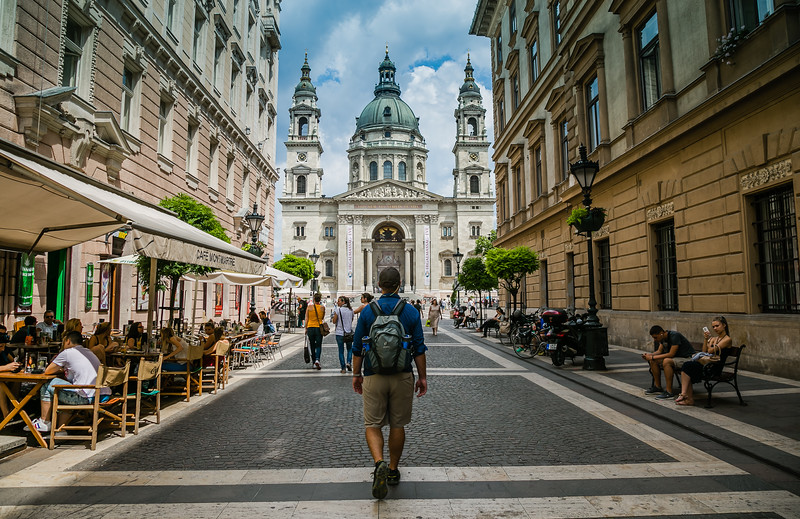
Another great safety trip for travel when it comes to keeping your valuables secure is to utilize a money belt or similar accessories to keep things hidden away.
These aren’t always foolproof, as the most intrepid of criminals might always find a way to separate your money from you, but hiding your spare cash and passport can at least stop opportunistic criminals from relieving you of your things.
We’ve also seen people using neck pouches that can be hidden under your clothes. Some claim these are more comfortable and easier to access when you need to.
12. Don’t Flash Your Valuables

Equally, another of the common-sense safety tips for travel is to not flash your valuables.
Don’t advertise your expensive electronics, and in some places, you won’t even want to have your phone out to use as a map while you’re walking around.
Bali, in Indonesia, is notorious for drive-by muggings, and many a tourist on the back of a moped has been relieved of their phone while they are riding around directing.
When you’re on trains or buses, anywhere in the world, keep your valuables in the seat with you at all times.
I think it also goes a bit without saying, but don’t leave your electronics out unattended. Whether on the charger, on your bed or on a table. This just invites opportunity.
13. Leave Your Diamonds at Home
If you are considering wearing your diamonds or fancy jewelry while traveling abroad, there are a few things that should be taken into consideration before making your decision.
- LOSS: How would you feel if your ring was lost or stolen? Is it worth the risk?
- UNWANTED ATTENTION: Are you comfortable attracting attention to yourself? Flashy jewelry will turn heads in the quietest of places. Remember, some countries people make in a year equal to what you are wearing on your finger or neck.
- SECURITY: There is no guarantee that you will be able to find a safe, secure place to keep your diamonds when you do not want to wear them. Not all hotel safes are secure.
- INCONVENIENCE: Are you doing adventure activities or spending lots of time at the beach or in the water? You don’t want to miss out on things because you have nowhere safe to put your diamonds or jewelry.
- SAFETY: Wearing nice jewelry makes you an easy target for robbery and crime- even in the nicest of cities. The wealthier you look, the more at risk you are for incidents.
Our Advice? Leave the diamonds at home! The photo above shows both my wedding ring and the band that I wear when I travel.
I am not willing to risk those diamonds, not to mention they are vintage depression era stones, so I picked out a solid Tungsten band for traveling.
I picked that band up on OverStock for less than $30.
14. Be Careful of Pickpockets

When you’re traveling in crowded cities, public transport can be a haven for pickpockets, be it the London Underground or the metro in Barcelona.
Keep your valuables close, and be aware of your surroundings. If it’s peak time, you might want to avoid crowded public transport too and walk instead.
If you are lounging on a popular tourist beach, then be extra careful of your belongings, as one glance away and you could be relieved of your bag. On night buses and trains, be careful with your bag, as you could easily wake up only to discover it’s gone.
Never carry your wallet, cash or passport in your back pocket. EVER.
15. Wear Your Backpack/Camera/Purse on the Front in Crowded Areas
If you like to carry a purse or day bag with you when you’re out exploring, just know that doesn’t mean your contents are secure within it.
If you happen upon a crowded area, get on a packed bus or train, we advise that you immediately put your bag in front of you and keep it there.
This will limit access to your bag without your awareness. If you have a backpack , just turn it around and wear it on your chest. With purses, we strongly recommend you keep the strap on as a sling and then slide it to the front of your body.
If you like to carry your camera out when you travel, this is the part where I advise you to invest in a sling strap. Or at least a strap that is long enough to wear as a sling when you need to.
Someone is going to be way less likely to make an attempt on your camera if you have it more secure to your body.
Knowing where your bag/camera is and who is near it will go a long way to keeping your things protected from opportunistic theft.
16. Know the Scams

Scams designed to separate you from your money or items are prevalent all over the world. The people that operate them do so for a living and are very good at conning even the most conscious traveler out of something, so don’t think it cannot happen to you.
It will go a long way to do some research ahead of time and learn what the common scams are in the places that you are planning to visit. This will help you to spot these situations from a mile away.
These are some of the most common scams you will come across while traveling:
- Broken Taxi Meter: This will usually result in you being charged double, or more for your ride.
- Hotel worker: When you come across a local on the street that claims to work at your hotel. A technique used to get you to spend money at their shop.
- When a taxi driver says “That hotel/hostel does not exist anymore”: A lie to get you to book a room at their hotel
- Flattery: If you are suddenly approached and flattered to no end, move your purse to the front of you and walk away.
- Damaged Motorbike/Car Rental when returning: Always, ALWAYS, take photos of your car/bike when you pick it up and return it.
- Offering to take your photo: And then promptly runs off with your phone or camera
- Let me see the map on your phone: Then snatches the phone and runs
17. Use Ride-sharing Apps

Another of our top travel safety tips is to use ride-sharing apps where you can. Although this means having WiFi or investing in a local SIM card, using apps like Grab in Southeast Asia or Bolt in Europe, provide a new level of accountability.
As well as being easier to use if you don’t speak the local language, there’s no need for negotiation and no chance of being ripped off.
You can also track where you, where you are going, and importantly, all the drivers are verified and their number plates registered.
The top ride-sharing apps worldwide are:
- Uber.
- Lyft.
- Zimride.
- Trees For Cars.
- Wingz.
- Juno.
- Gett.
Not all countries will offer the same ride-sharing services, so be sure to do your research in advance so you can have the right apps downloaded when you arrive.
To be honest, we rarely use local taxi services anymore and have relied solely on ride-sharing apps for almost 2 years now when we travel.
18. Dress & Behave Appropriately
This is one of the most important safety tips for travel. Not all countries around the world will share the same dress codes and behavior that you do in your home country.
Do not, under any circumstances, travel to a place and think this is not important.
Whether you agree with things in that country, or not, you are choosing to travel there. If you want to be safe and respected by the local people, dress in a way that offers that. Be aware of cultural behavior and comply when you can.
Going to a foreign country and spouting frustratingly about things because they are not done that way at home, will get you nowhere. It also won’t buy you many fans. The key is to immerse in your new environment and do your best to blend in.
19. Wear a Helmet & Buckle Up
This is a simple one but it always blows my mind how few people actually do it. If you have the ability to buckle up in a vehicle when in transit, do it.
There are many countries in the world where not buckling up is illegal. Not to mention that you’re choosing to disregard your own safety.
Motor laws are very different in many foreign countries and with some cities being jam-packed with drivers, the risk of being in an accident is increased when you travel.
The same goes for wearing helmets. If you are getting on a motorbike or a horse, put on the helmet. There are literally no advantages to not doing it.
20. Food Hygiene is Important
There’s nothing worse than getting ill on the road, and unfortunately, the vast majority of travelers – especially long term travelers – will inevitably end up getting sick.
This can be down to unfamiliar foods and diets, but most important of all is food hygiene. While you don’t want to not eat local food, just be careful.
Watch how it’s prepared, check reviews online if you are going to a restaurant, and be wary of anything that might have been left out for too long in the sun, or that was prepared in the morning and is still for sale late at night.
We’ve been sick while traveling more times than we care to admit, ranging from mild stomach upset to full-on raging sick.
All from ill-prepared food. At this stage, it is kind of an inevitable thing with travel. so be mindful, but know it could happen.
Be sure have these items in your first aid kit, just in case you need them:
- Nuun Sport: Electrolyte-Rich Sports Drink Tablets (will literally turn off diarrhea)
- Emergen C Tablets
21. If It Doesn’t Feel Right, Don’t Do It

This safety tip for travel is simple. If it doesn’t feel right, don’t do it. More often than not it can be very clear if something seems sketchy, and if the taxi ride seems too good to be true or if the city seems dangerous after dark, then follow your gut instincts.
This also goes for animal welfare. If you see things that don’t look right, do not support it.
You don’t want to feel uncomfortable, so make a wise choice and reevaluate, rather than regretting things later on or getting into danger.
22. Minimize Your Alcohol Consumption
We know it can be exciting to finally be on vacation and exploring a new place. While it is perfectly acceptable to consume alcohol while traveling, it is very important that you refrain from getting trashed.
Drinking too much, especially when you’re in an unfamiliar place, can lead to some dangerous situations. Have a couple at dinner or with new friends at the bar, but we highly recommend avoiding getting drunk.
We’ve seen some pretty scary stuff in our travels, with people being dangerously drunk and getting taken advantage of. Not drinking responsibly can be a great way to separate yourself from your money, dignity, and safety.
23. Keep Your Guard Up with Strangers
This one is a bit of a double-edged sword, but in our experience absolutely critical when you are traveling in a new place.
In your travels, you’re likely to encounter many friendly people that are willing to give you company or help you out.
While it is perfectly fine to chat with people and make friends, make sure you are not giving away too much trust, too fast. 90% of the people that you meet traveling are harmless and genuinely want to get to know you. The rest is what you have to worry about.
Consider a person’s motives, ask questions and protect your own interests if something doesn’t feel right. Don’t be afraid to say ‘no thanks’ and walk away.
Certainly, don’t give away sensitive information to new people you meet. This includes where you are staying.
24. Explore with Purpose
This is one of the best safety tips for travel we can give you. When you are out on the streets, walk around with a sense of purpose.
Even if you are lost, you should still try to walk around as if you know where you are and where you are going. This makes you less of a target.
If you need to check your map or phone, pause to look at something or sit down at a cafe for a coffee to regroup. This is better than searching on the sidewalk and appearing lost to passerby people.
25. Have a Cash Stash
This is something we started doing when we started long term travel. To ensure we always had something, in the event that we were robbed, we began stashing money in random places within our luggage and items.
This ensured that we would have something to fall back on if our wallet or carry bag was stolen.
Luckily, we never had to utilize the cash stash (you get hyper-vigilant when you travel full time!) but it was comforting to know we had it.
More on Travel Planning:
- How to Plan A Trip: Step by Step Guide
- How to Save Money for Travel: A Step by Step Plan
- 10 Killer Tips on How to Find Cheap Flights
- 11 Easy Tips on How to Find Cheap Accommodation
- The Best Travel Wallets for Your Important Essentials
- 7 Exotic Places to Travel Without a Passport
- 21 Amazing Travel Adventures to Inspire Your Next Trip
- Travel Insurance for Europe Vacation: Do You Need It?
- How to Choose the Best Travel Insurance Policy
- 10 Reasons to Have Annual Travel Insurance
Did you like this story? Share it!
Travel planning resources, about lina stock.
Lina is an award-winning photographer and writer that has been exploring the world since 2001. She has traveled to 100 countries on all 7 continents. Member: SATW, NATJA, ATTA, ITWA
2 thoughts on “25 Essential Safety Tips for Travel”
What a fantastically thought out list! This is so so helpful and some amazing tips here, even as a season traveller it’s important to remind yourself!
Thanks very much 🙂
Precaution is better than cure. Thanks for sharing these safety tips which are very important for everyone.
Leave a Comment Cancel reply

You are using an outdated browser. Upgrade your browser today or install Google Chrome Frame to better experience this site.
Your Survival Guide to Safe and Healthy Travel
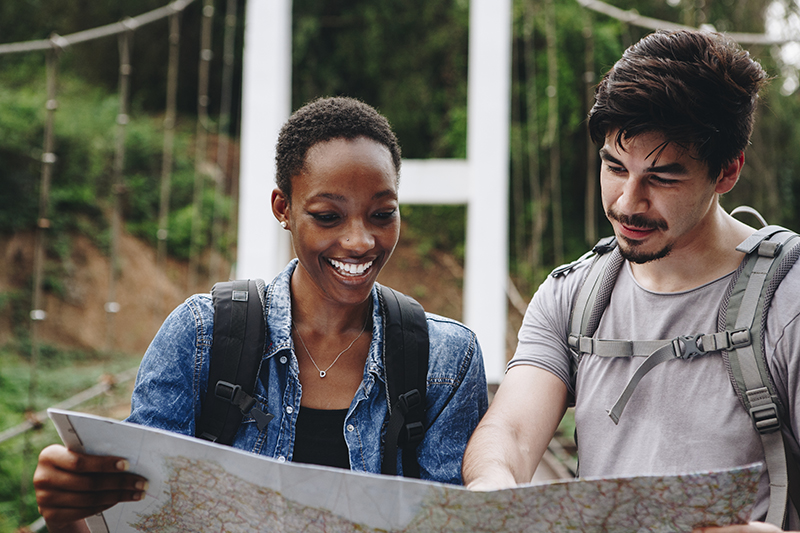
Before You Go
Take these steps to prepare for your travels aboard and anticipate issues that might arise.
Check your destination for country-specific health risks and safety concerns . You should also know your health status before you make travel plans. When you are sick, you can spread diseases to others. Postpone your travel and stay home when you are sick.
Make an appointment with your health care provider to get destination-specific vaccines, medicines, and advice at least a month before you leave. Discuss your itinerary and any planned activities with your provider so that he or she can make customized recommendations to ensure a healthy and safe journey.
Make sure you are up-to-date on all of your routine vaccines, including measles-mumps-rubella (MMR). Measles and other infectious diseases can spread quickly in a large group of unvaccinated people.
Plan for unexpected health and travel issues. Find out if your health insurance covers medical care abroad—many plans don’t! Make sure you have a plan to get care overseas , in case you need it. Consider buying travel insurance that covers health care and emergency evacuation, especially if you will be traveling to remote areas.
Prepare for emergencies. Leave copies of important travel documents (e.g. itinerary, contact information, credit cards, passport, proof of school enrollment) with someone at home, in case you lose them during travel. Make sure someone at home knows how to reach you in an emergency and carry your emergency contacts with you at all times.
Enroll with the Department of State’s Smart Traveler Enrollment Program (STEP) . Monitor travel warnings for your destination. Enrolling also ensures that the US Department of State knows where you are if you have serious legal, medical, or financial difficulties while traveling. In the event of an emergency at home, STEP can also help friends and family contact you.
Pack smart. Prepare a travel health kit with items you may need, especially those that are difficult to find on your trip.
- Fill your travel health kit with your prescriptions and over-the-counter medicines (enough to last your whole trip, plus a little extra), a first aid kit, insect repellent , sunscreen (SPF15 or higher), aloe, alcohol-based hand sanitizer, water disinfection tablets, and your health insurance card.
- Please visit the Traveling Abroad with Medicine for more information.
During Your Trip
Choose safe transportation. Always wear a seat belt, and children should ride in car seats. Motor vehicle crashes are the leading cause of death among healthy travelers. Be alert when crossing the street, especially in countries where people drive on the left side of the road. Find out other steps you can take to stay safe on the roads.
Avoid bug bites. Use insect repellent and take other steps to avoid bug bites. Bugs, including mosquitoes, ticks, fleas, and flies, can spread diseases such as malaria, yellow fever, Zika, dengue, chikungunya, and Lyme. These bugs are typically more active during warm weather.
If you or a travel companion gets an injury or sickness that can’t be helped with basic first aid or an over-the-counter medicine, seek medical attention right away. Visit Getting Health Care During Travel to learn how to connect with a doctor or medical services during your trip.
Choose safe food and drink. Contaminated food or drinks can cause travelers’ diarrhea and other diseases and disrupt your travel. Travelers to low or middle income destinations are especially at risk. Generally, foods served hot are usually safe to eat as well as dry and packaged foods. Bottled, canned, and hot drinks are usually safe to drink. Learn more about how to choose safer food and drinks to prevent getting sick.
Protect yourself from the sun. Apply sunscreen with SPF 15 or higher when traveling. Protecting yourself from the sun isn’t just for tropical beaches—you can get a sunburn even if it’s cloudy or cold. You are at the highest risk for UV exposure when you are traveling during summer months, near the equator, at high altitudes, or between 10 am to 4 pm.
Wash your hands. Regular handwashing is one of the best ways to remove germs, avoid getting sick, and prevent the spread of germs to others. Wash your hands with soap and water. If soap and water are not available, use hand sanitizer containing at least 60% alcohol.
Be safe around animals. Avoid animals , including pets, local farm animals, and wild animals. In addition to the risk of rabies, all animal bites carry a risk of bacterial infection.
Be careful during water activities. Drowning is a major cause of death when traveling. Follow water safety recommendations , which includes swimming, boating and diving, especially in countries where emergency services may not be quickly available.
After Travel

If you traveled and feel sick, particularly if you have a fever, talk to a healthcare provider and tell them about any areas you recently traveled to.
If you need medical care abroad, see Getting Health Care During Travel .
File Formats Help:
- Adobe PDF file
- Microsoft PowerPoint file
- Microsoft Word file
- Microsoft Excel file
- Audio/Video file
- Apple Quicktime file
- RealPlayer file
- Zip Archive file
Exit Notification / Disclaimer Policy
- The Centers for Disease Control and Prevention (CDC) cannot attest to the accuracy of a non-federal website.
- Linking to a non-federal website does not constitute an endorsement by CDC or any of its employees of the sponsors or the information and products presented on the website.
- You will be subject to the destination website's privacy policy when you follow the link.
- CDC is not responsible for Section 508 compliance (accessibility) on other federal or private website.

58 Expert Travel Safety Tips For Traveling Alone
- March 23, 2023
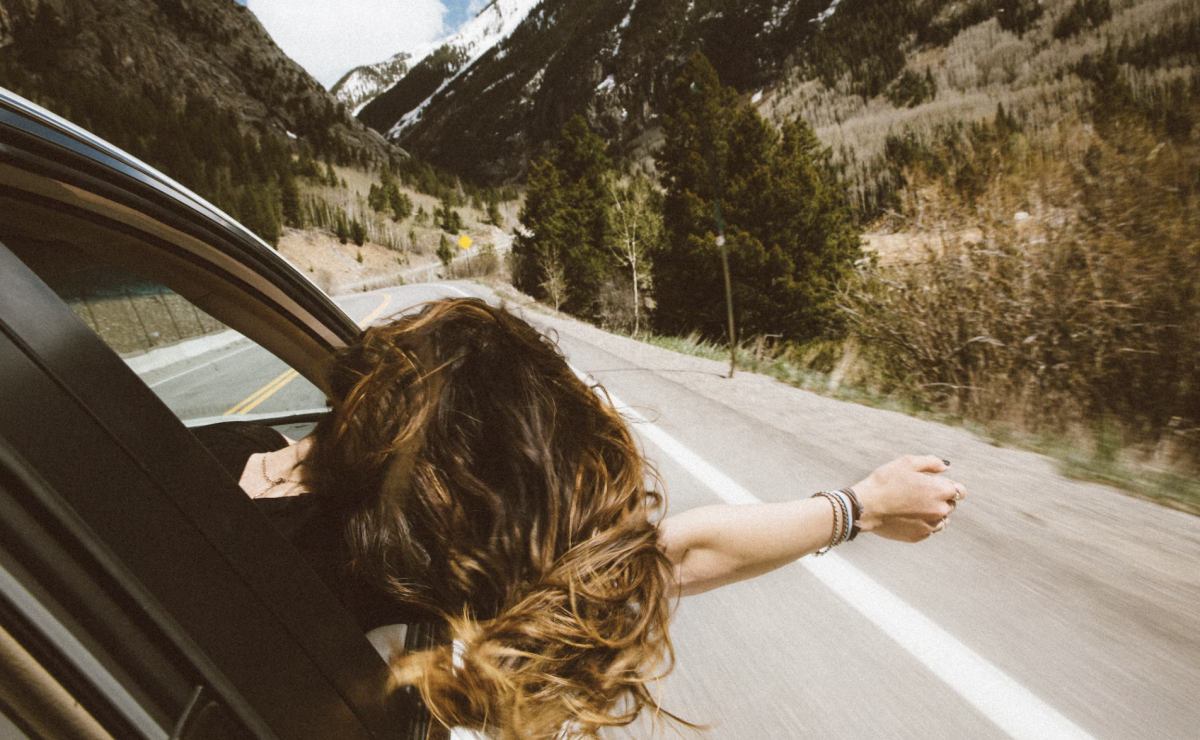
Table of Contents
Disclaimer : We try to make our content as useful as possible, however Personal Safety School bears no responsibility for any injury or loss incurred as a result of following advice published on our website.
Let me tell you something. Travel safety tips aside, solo travel is the ultimate rush. Pound-for-pound, no activity on earth offers more beauty, wanderlust, or excitement. The thrill of discovery, the excitement of exploring uncharted territories, the chance to live life on your own terms. But there’s a catch. The road to adventure is never without its pitfalls.
But fear not, reader. The seasoned travelers of this world have learned the hard way, and they’re passing on their wisdom to you. So listen up and heed their advice before you embark on your solo journey. The last thing you want is to end up like that young lady lost in a dark alley. Or the gap-year traveler who had all their valuables swiped. Or that poor soul who thought a fancy restaurant would make for a good time, only to spend the next week hugging the toilet in the most beautiful city of them all.
Yes, these are cautionary tales, but they don’t have to be your story. By following the travel safety tips and tricks of the trade, you can dodge these pitfalls and have the solo adventure of a lifetime. So go forth, my friends, and travel safely.
Before You Go
Wise up on travel scams.
There are hundreds of travel scams that anyone could easily fall victim to if they weren’t aware they existed. These scams range from basic pickpockets and “here, feed the pigeon this food” scams to unlicensed, unmetered taxis, credit card skimming, fake tickets, identity theft , and impressive all-out hustles that wouldn’t look out of place in a Hollywood movie.
This isn’t to fearmonger—most people are incredibly honest. However, scammers are more common than you may think, especially in tourist destinations. So before you head off on your adventure, search Google for “Common scams in ….” and familiarize yourself with what to look for. Also, research travel safety tips to prevent scams!
Get Your Vaccinations
Find out what vaccinations you might need before visiting a country before you set off. Some vaccines can take months to properly take effect on the body, and some require boosters to be effective. So be prepared well in advance and book your vaccinations in good time to ensure you’re protected when you eventually land.
Read Travel Advisory Websites
Before booking your trip, check your local government’s travel advisory website. For U.S. readers, the U.S. Department of State has a travel advisories website for U.S. residents. USA.gov also has some great information. The official government website in the UK has a detailed Foreign Travel Advice page covering over 220 countries. The Government of Canada also has a similar travel advisory website .
If there are restrictions or warnings about specific destinations, your travel insurance can be invalidated. So check this before you book and again before you depart.
Research The Local Culture
Research the local religion, culture, dress sense, etc. This will stand you in good stead when you arrive. The last thing you want to do is offend the locals simply due to your ignorance. Not only is this a bad form for a traveler, but it can also turn people against you.
In some places, criticizing the government or monarchy is a strict no-no and can land you in hot water with the locals and law enforcement. The same is true for wearing revealing clothes when visiting a religious site (this is often true for men, too, not just women). The list goes on.
Let People Know Your Itinerary
As a solo traveler, you really need to keep people up to date with where you’re going and what you’re doing. This doesn’t mean publicly announcing your travel plans on social media (which is a danger in itself), but at least keep your family and/or friends back home privately updated with where you are (and where you’re staying) and where you’re going next. This way, should the worst happen, and you go missing, people will know where to start looking.
Inform Your Bank
Before you go overseas, inform your bank about which countries you’re visiting and what dates you’ll be in each location. Most banks allow you to do this online or via their mobile app. This makes it much less likely that your debit and credit cards will be blocked when you first try to use them on your trip.
Similarly, always take more than one cash card with you. If one is lost, stolen, or locked, you should always have at least one backup card to use.
Make Sure You Have Data On Your Phone
Before hopping on that flight, ensure you’re confident you’ll be able to access your mobile data when you land. This will make things much easier than landing and finding that you can’t access the internet, figure out how to get to your hotel, and can’t access your booking information!
To do this, ensure your roaming settings are set up correctly. Call your provider about this if you’re unsure. They will be able to help you enable the right settings on your phone. Similarly, ask how much you will have to pay to use data in the country you’re traveling to. Buying a local SIM may be more cost-effective than using your usual SIM.
Research Transport Options
Before setting off, quickly do a Google search to find out what the transport options are at your destination. Public transport works differently in different places (sometimes you need a ticket before you board, other times not). Find out when the first and last buses and trains run. Research how to ensure taxis are safe, what an average fare costs, whether they use meters, etc.
The more you know about transport options, the better decisions you can make on the fly.
Know Phone Numbers For Emergency Services
This one is often overlooked. Imagine you’re injured, attacked, or robbed. Do you know how to call the police or an ambulance? Do a quick search to find out the local emergency number and remember this, or store it somewhere secure, like in your secret money belt (and on your phone).
Learn Some Basic Vocab
In countries where your natural language isn’t widely spoken, learn the basics – hello, thank you, please, goodbye, excuse me, help, etc. Not only will this help you to make a good impression, but your friendliness will help you build rapport with locals who will, therefore, be more likely to be friendly to you and help you if you’re in need.
Download an Offline Map
Most map apps now allow you to download an offline map of specific areas. Do this before you venture out so that you can still find your way around even without data. Save your hotel to the map so you can always find your way back, along with places you want to visit, or any other locations you may need.
Download an App For Emergency Alerts
For U.S. readers, download the Smart Traveler app. This is the official State Department app for travelers and will help you stay informed about emergency alerts (among other things). If you’re visiting an area prone to extreme weather, volcanic eruptions, earthquakes, etc., take a look online to see which apps are recommended to alert you about approaching situations in your destination.
Keep a Basic First Aid Kit
Let’s face it: With all those different bacteria in the water, varied cuisines, and adventure activities, you might not always feel on top of the world. Pack some basics like diarrhea and constipation tablets, dehydration capsules, bandaids, paracetamol, allergy tablets, etc. If you do have prescription medication, check the legality of these in the countries you’re visiting ( before you set off).
Boring But Important
Keep a copy of your emergency info.
Take photos of your main passport page, visa, and driving license. Store important emergency phone numbers and addresses somewhere you can easily access them (hint: insurance documents, accommodation bookings, etc.).
Save these in an easily accessible folder on your computer or smartphone, and print out physical copies in case your gadgets are stolen.
Don’t Skimp on Travel Insurance
Perhaps you’ve been on 20 trips before and never needed to use your travel insurance—lucky you! But all it takes is one accident or one misstep, and that $150 you spent on travel insurance could save you a fortune.
That being said, you must understand what’s included in your policy before paying for it. If you’re on a longer trip, check if the insurance covers the number of days you’ll be away. If you’re doing any kind of adventure sport, check this is covered. Are you carrying valuables? Or cash? These may only be insured up to a certain value. Many policies won’t cover your gadgets (you could need separate gadget insurance for this). Read the wording carefully.
If you’ve bought the wrong policy, many insurance companies offer a cooling-off period so you can still cancel!
Take Emergency Money (And Hide It)
In addition to the regular cash you’ll carry daily, you should also have some emergency cash stored somewhere secure. This is your backup fund in case you’re robbed and you lose your bank cards or if your bank cards just don’t work.
Copy Your Important Documents
In many countries, you’ll need to show things like flight reservations and accommodation booking confirmations when you check in at a hotel or hostel. Be sure to have physical copies of these in case your phone battery dies, so you can still check in.
Lock Down Your Valuable Belongings
This goes without saying, but keep any valuables secure. If you’re in a hostel, hire a locker. Double-check your hotel doors are double-locked. If there’s a bolt or chain for the door, use it. This will add extra security even against lock bumping . If you carry everything in a backpack or suitcase, use a decent padlock to add an extra hurdle for thieves. If you don’t have a locker, hide your valuables out of sight in your room.
Write Down The Name and Number of Your Accommodation
I was once traveling in Thailand, and one evening, I found a woman stumbling around with blood all over her hands and legs. Turns out she’d arrived that morning, hired a scooter with her boyfriend, and decided to get drunk.
Once the evening ended, they jumped on the bike, sans helmet, and the boyfriend sped off. The woman fell off the back and cut herself up pretty badly. The lovely boyfriend didn’t notice and disappeared into the distance. We asked her where she was staying so we could help her back. Between sobs and in broken French and English, we learned she hadn’t saved the name or phone number of her hotel anywhere, and she couldn’t remember where she was staying. In the end, we took her to a local hospital to sober up and have her cuts and bruises checked over. We took her number and checked, and she’d eventually found her way back to her boyfriend (which she had).
The lesson? Wear a helmet, don’t drink too much, and definitely don’t drink and drive. Find a responsible partner, and write down the name and phone number of your hotel !
Out and About
Trust your gut.
Your instinct is a miraculous thing. Somehow, from someplace, it senses danger, good and bad energy, and points you in the (hopefully) right direction. Sure, it makes mistakes sometimes, but if you sense unease in your gut, you either ate a dodgy sandwich, or there’s potentially something awry that you need to give special attention to. Ignore that gut instinct at your peril.
Be Willing to Pay More For More Safety
As a solo traveler, splashing a little extra cash to improve your safety is often the right thing to do. Pay the extra $20 for a flight that arrives at a reasonable time. Buy a ticket for the bus that takes you into the town rather than the dodgy outskirts. Hire a legit taxi rather than walking the two miles back to your hotel at 3 a.m.
Extra peace of mind and safety can come for a small but reasonable price.
Don’t Leave Your Bag’s Side
One of the most common issues travelers have to deal with is having their bag swiped—this is easily avoidable. Keep your bag with you at all times. If you’re resting on a bus, put your arm through the arm straps so it can’t be quickly pulled away from you. Tie the bag to your table or chair if you’re in a cafe.

Use a Money Belt
Money belts are secret, inconspicuous belts that you can wear under your clothes to store cash, passports, jewelry, etc. This means if you’re pickpocketed or robbed, many of your valuables are still safe.
Beware of Purse Snatchers
Unfortunately, purse snatching is a big problem almost everywhere. Read our article on how to protect yourself against purse snatchers to reduce your risk of being a victim of this common crime. In short, be aware of your surroundings, hold on tight, use a purse with secure closures, use a cross-body strap, avoid designer bags, and keep valuables out of sight.
Don’t Take Risks For Photos
The risks people seem prepared to take for an Instagram shot are terrifying: climbing crumbling buildings, teetering on the edge of a cliff, hanging out the door of a moving train. Risking life and limb for some social media likes is not cool. Seriously, there are plenty of other ways to collect interesting stories to tell when you’re back home.
Be Cautious At ATMs
There are dodgy ATMs all over the world. Some are not maintained properly, others have card-swiping gadgets attached, and others are in dangerous locations.
First, pick a location where you feel comfortable. I usually only use ATMs within an official bank (many official banks in Continental Europe have safe lobbies that are accessible 24/7). If anything looks strange about the ATM, don’t use it.
Whenever you use an ATM, all the usual rules apply: don’t let anyone see your PIN, be aware of people around you, and immediately put your cash somewhere secure.
Use Side Pockets (Not Back Pockets)
It only takes a second for someone to steal something from your back pocket and then disappear into the crowd before you can even turn around. It doesn’t matter if your back pockets are tight and you’ll “feel if someone tries to take anything”. Even if you feel the theft happening, a skilled thief will be long gone before you can react.
Instead, keep valuables in tight side/front pockets. These are much easier for you to keep an eye on. Plus, it’s easy to slip your hands into your pockets in busy areas to protect your belongings.
On a similar note, avoid putting valuables in loose pockets, such as those in coats and cargo pants. You’ll never know if someone is rummaging around.
Don’t Do Everything Alone
Just because you’re a solo traveler, it doesn’t mean you have to do everything on your own. Consider finding a group to enjoy the adventure with for anything with a heightened sense of risk. Hiking in the countryside? Join a group tour. Going for drinks at night? Tag along with a friendly group from your hostel (all the usual precautions apply, obviously).
Carry a Decoy Wallet
Many travelers swear by carrying a decoy wallet. Place your main wallet in an inside pocket or somewhere more hidden, and carry your decoy wallet in a more obvious spot. Fill it with some expired cards and a small amount of cash to make it look legit. Then, if you’re ever mugged, you can hand the perpetrators the decoy wallet instead of your real wallet.
Wear Your Backpack On Your Front In Busy Areas
When you’re surrounded by people, you’re most likely to be pickpocketed. That’s why it’s important to keep sight of the main compartments of your backpack in these situations to ensure no one’s rooting around. The best way to do this is to carry your bag before you escape the crowds.
Does That Stranger Really Want to Be Your Friend?
I’m all for making great friendships while traveling. In fact, you’ll probably make some of the best friendships you’ve ever had. But you must remember that in many places, people may approach you in the hope of eventually selling you something or convincing you to visit their friend’s shop, where you’ll be pressured into buying something at an exorbitant price. Err on the side of trust, but always be cautious and look out for red flags, such as someone constantly trying to shift the conversation to “oh, my friend has a shop you’d just love !”.
Wear a Helmet For God’s Sake!
I get it; hat-hair isn’t the best look for those Instagram selfies. But it’s far better than a week in intensive care (or worse). So before jumping on that scooter, motorbike, quad bike, or on those skis, don the goddamn helmet!
In addition, if you’re in an accident and you weren’t wearing a helmet when you should have been, your insurance will be void, meaning huge medical bills.
Put Your Seatbelt On
The same goes for seatbelts. I don’t care how indestructible you think you are; put the seatbelt on. Believe it or not, they’re fitted to cars for a reason. And again, if you’re in an accident and you weren’t wearing one, you will not be insured.
Check Your Insurance Before Renting a Vehicle
Before renting any vehicle, check your insurance covers whatever you will be driving or riding. If it doesn’t offer comprehensive coverage, including things like windscreen replacement and puncture repair, consider paying a small additional fee at the rental office for full insurance. Read the documents carefully to know what’s covered and, just as importantly, what isn’t.
Understand The Rules of The Road (For Pedestrians, Too)
Before I hit the road after renting a vehicle, I always watch a quick YouTube video or read a couple of blog posts about driving in my new location. This gives me a crash course on strange rules of the road, where I’m allowed to park, and local driving quirks I wouldn’t otherwise know.
Keep an Eye on GPS When in a Taxi
This is another benefit of having an offline map downloaded onto your phone. When you’re in a taxi, keep one eye on your GPS to check that the driver is actually headed in the right direction.
If they veer off-course, ask them why. It may be that they know about some roadworks ahead, or they may be taking you on a very roundabout way to get more money out of you. Trust your gut in these situations. If something seems off, be assertive. Either get the driver to correct course or confidently tell them to stop and leave the vehicle (if you feel the area is safe).
Only Use Reputable Transport Companies
One of the main ways people are conned while traveling is through disreputable travel companies. Taxis that refuse to use meters (or use tampered meters). Private hires that drop you off miles from your destination. Selling you tickets for buses that don’t exist.
Do some research, find transport companies that have good reputations, and stick with them. Following your instinct is often a good bet if you can’t find this information. If someone seems shifty, don’t rely on their business. Asking the reception staff at your hotel for recommendations is often a good option here, too.
Food and Drink Travel Safety Tips
Don’t eat everything you see.
Food is probably the best part of traveling, though you have to be cautious. After visiting almost 60 countries, I’ve had bad food poisoning twice. But the tell-tale signs were there. The restaurant was practically empty, whereas other places down the street were busy. The waiters were careful to hide the kitchen. And I immediately thought the food tasted off.
I’m now much more careful: I’ll avoid tourist traps where food is often cooked to a low quality. I’ll always try to glance at the kitchen to check that it looks clean and to make sure there’s no obvious cross-contamination (especially between raw meat and salad), and I’ll pick somewhere where locals like to gather, and I’ll double-check the food before I eat it, making sure it looks fresh, that any meat is cooked thoroughly, and that everything smells ok.
Be Cautious Around Drinking Water
This is one of our more obvious travel safety tips. Although I personally think some people can be over-cautious about drinking water, caution should still be taken. Generally, if locals are drinking free water in a restaurant, tourists may drink it too, but only if they’ve given their gut a chance to adapt to the local bacteria (do your own due diligence here). This can take several weeks, so if you’re only visiting for a week or so, you may want to stick to bottled water.
If you are worried about water making you sick, first check online to see if local tap water is drinkable. If you can’t find the information, ask a local. In restaurants, stick to bottled water, and ensure the waiter opens the bottle before you so you know it was sealed. Opt for no ice, and be careful around salads that may have been washed in tap water.
Clean Cans Before Opening Them
It’s not uncommon for people to get sick from drinking soda cans because the top was dirty or they were stored somewhere; mice or rats may be running around. Always wipe the can before you open it; if you’re unsure of its cleanliness, drink it with a straw.
Eat Well. Stay Healthy.
Traveling is hard on the body, but we have travel safety tips for this issue, too! Finding healthy food can be difficult, and long days on the road can be exhausting. So make sure you take time to rest. Take multivitamins if you think you need them and treat yourself to some healthy food!
Many bad decisions are made because you’re fatigued or not feeling well, so keep yourself in tip-top shape so you’re in a position to look after yourself properly.
Party Safely (And Never Take Illegal Drugs)
When going out to a party, take all the usual precautions you would take at home, and then take some. Keep your drink with you. Don’t let anyone slip anything into your glass when you’re not looking.
You’ll also want to do a bit of research on laws about drug use. Even drugs as “soft” as marijuana can land you in a lot of trouble in some countries. If you’re in the LGBTQ community, check the laws and customs where you’re traveling and find a safe and accepting place to go.
Don’t Drink Too Much (Travel Safety Tips For Those Who Partake)
This goes without saying, but the more you drink, the more at risk you are. Not just of being taken advantage of, but also of drowning – going for a swim when drunk really isn’t a good idea – and of getting into a traffic accident, both as a pedestrian and as a driver.
Whatever amount you may be comfortable drinking with a close group of friends, dial it back when you’re alone. This is one of our most important travel safety tips, and travelers who are planning to party should pay attention to it!
Beware What You Tell Strangers
By all means, have a great time with locals and people you meet on the road, but just be mindful of the kind of information you divulge, especially after a drink. Don’t give out any compromising information to strangers that could land you in trouble down the line. This is one of our most important travel safety tips!
Body Language & Fitting In
Don’t be an obvious tourist.
Act like a local. Blend in. Don’t attract attention. The last thing you want is for everyone to know you’re a tourist instantly. So channel your inner Jason Bourne and aim to be as inconspicuous as possible to attract as little trouble as possible. Our travel safety tips and these recommended travel devices will hopefully help you feel more confident as a tourist!
Take a Self-Defense Class (Or Two)
If you’ve absolutely no idea what to do in a situation that requires you to defend yourself, take a few classes (or watch a few YouTube videos). Get the basics down. Having that knowledge in your repertoire will give you additional confidence to deal with situations when they arise.
Study Body Language
Like studying self-defense, knowing what body language to look out for while out and about is a skill every traveler should have.
Generally, the more you travel, the more you’ll learn about body language as you’re exposed to so many people over such a short period of time. But if you’re not very confident in this area, grab a book, or watch some videos, and learn the tell-tale signs to look out for that’ll inform you when something’s not right, when someone is probably lying to you, or when someone is planning something untoward.
Be Kind to Locals (While Keeping Our Travel Safety Tips In Mind)
Not only is this blatantly the right thing to do, but it also reduces the risks of things going wrong. If you’re polite to your waiters, they will likely look out for you. If you’re kind to the staff at your hotel, they’re more likely to give you useful advice. It’s human nature.
On a larger scale, if tourists are generally a miserable, rude bunch, people will have no qualms about treating them badly in return. Those good manners will be reciprocated if they’re happy, friendly, and kind.
Quiz Locals
Every interaction with a local is a fantastic chance to learn more about the local culture, including the best places to eat, the places to avoid, and things to look out for. Don’t always focus on the negatives in these interactions; instead, garner what useful knowledge you can!
Portray Confidence
Criminals and scammers can spot a nervous traveler a mile off, so learn to fake confidence. Hold yourself tall, walk purposefully, keep your head on a swivel, and don’t look meek and lost. This alone will keep you safe from a large portion of scammers.
Don’t Flaunt Wealth
Don’t show off expensive items such as jewelry and gadgets, especially in poorer countries. This is just asking for trouble. If you do need to use your expensive laptop, be aware of where you use it, store it securely, and never leave it unattended. Remove expensive jewelry before you go out. Or better yet, don’t take it away with you at all.
More Travel Safety Tips
Be cautious on public wi-fi.
Digital travel safety tips are often overlooked. Public Wi-Fi carries all sorts of risks. If whoever set up the Wi-Fi didn’t do so correctly, it’s far easier for a hacker to infiltrate your data than you may realize. So, whenever you use public Wi-Fi, be sure to also log into a VPN simultaneously. This masks your internet activity, making it much harder for nefarious actors to steal your data. This is especially important when logging into important accounts such as your online banking or email accounts.
Sign up for a good VPN before you leave on your trip, and familiarize yourself with how it works on all of your devices.
Don’t Always Expect Equality
Yes, gender inequality is still a problem in most places around the world. In some places, it’s more subtle. In other places, it’s all out there on display, with women being treated vastly differently to men. Unfortunately, this is part and parcel of travel, and even though it may drive you insane, be mindful of how you react so as to not turn people against you or in a way that will escalate the situation.
Wear The Right Kit
Now for some mountainous travel safety tips. If you’re hiking a mountain or camping under the stars, wear the right kit for the conditions you will be in. In the mountains, the weather can change on a whim. You need emergency gear to keep warm and dry, and your footwear needs to be suitable. Yes, that means no flip-flops. Too many mountain rescue teams are called out to carry someone off a mountain because the kit they took up there was not up to the job. The same goes for water sports, snow sports, etc.
Know How to Escape
Granted, this may sound over-the-top but try to be aware of emergency exits and ways out of your hotel room, for example. This only takes a minute to assess. Hopefully, you’ll never need to use that knowledge, but it’s there for worst-case scenarios.
Only Use Legit Pharmacies
Your home country may only have reputable pharmacies open to the public, but this isn’t the case everywhere. Some countries have much more lenient rules on how pharmacies operate, so do a bit of research and (if you need one) find a pharmacy that has good reviews and is ideally part of a larger reputable chain.
Lock Your Hotel Room
This is among our most obvious travel safety tips, but always double-check that you’ve double-locked your hotel room. This applies not only when you leave the room but also when you’re in it. Don’t simply rely on shutting the door (even if that “locks” it). Always double-lock the door to make it as difficult as possible for intruders to gain access.
Consider Carrying a Personal Alarm
A personal safety alarm can be a good addition to keep in your bag or pocket if you’re not feeling very safe in some areas. If you ever feel threatened, you can sound the alarm, which should be loud enough to scare off the attacker and hopefully attract the attention of other people who can help you.
Heed These Travel Safety Tips
Yes, this article contains many travel safety tips, but this isn’t to make you scared of traveling. I’ve very rarely felt unsafe or threatened while traveling. In fact, I usually feel safer than I do at home. But precautions still need to be taken.
Staying safe on the road is largely down to knowing what to look out for, researching travel safety tips before you venture out, being cautious, being attentive, and doing a little research and prep work before you venture out. Most of the travel safety tips here are quick and don’t require much work or effort but simply require you to be mindful of how you approach traveling so you can have the best time possible.

Be aware, and stay safe!
Found this article useful? please share it with your friends!
And to stay up to date with our latest content, don’t forget to follow us on Facebook !
- safety , travel
Sign Up To Our Newsletter
By signing up, you agree to our Privacy Policy .
Comments (0)

What to Do if You’re Attacked by a Coyote
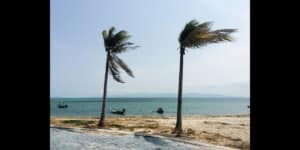
Hurricane Categories Explained: What Do They Mean?

What Is an Amber Alert? Everything You Need to Know
Get Personal Safety Tips Straight to Your Inbox
By signing up, you agree to our Privacy Policy
Get smartphone savvy the easy way: Join our seven-day email challenge to receive helpful tips each day.
AARP daily Crossword Puzzle
Hotels with AARP discounts
Life Insurance
AARP Dental Insurance Plans
AARP MEMBERSHIP
AARP Membership — $12 for your first year when you sign up for Automatic Renewal
Get instant access to members-only products, hundreds of discounts, a free second membership, and a subscription to AARP the Magazine.
- right_container
Work & Jobs
Social Security
AARP en Español
- Membership & Benefits
- AARP Rewards
- AARP Rewards %{points}%
Conditions & Treatments
Drugs & Supplements
Health Care & Coverage
Health Benefits

Staying Fit
Your Personalized Guide to Fitness

Get Happier
Creating Social Connections

Brain Health Resources
Tools and Explainers on Brain Health

Your Health
8 Major Health Risks for People 50+
Scams & Fraud
Personal Finance
Money Benefits

View and Report Scams in Your Area

AARP Foundation Tax-Aide
Free Tax Preparation Assistance

AARP Money Map
Get Your Finances Back on Track

How to Protect What You Collect
Small Business
Age Discrimination

Flexible Work
Freelance Jobs You Can Do From Home

AARP Skills Builder
Online Courses to Boost Your Career

31 Great Ways to Boost Your Career

ON-DEMAND WEBINARS
Tips to Enhance Your Job Search

Get More out of Your Benefits

When to Start Taking Social Security

10 Top Social Security FAQs

Social Security Benefits Calculator

Medicare Made Easy
Original vs. Medicare Advantage

Enrollment Guide
Step-by-Step Tool for First-Timers

Prescription Drugs
9 Biggest Changes Under New Rx Law

Medicare FAQs
Quick Answers to Your Top Questions
Care at Home
Financial & Legal
Life Balance

LONG-TERM CARE
Understanding Basics of LTC Insurance

State Guides
Assistance and Services in Your Area

Prepare to Care Guides
How to Develop a Caregiving Plan

End of Life
How to Cope With Grief, Loss
Recently Played
Word & Trivia
Atari® & Retro
Members Only
Staying Sharp
Mobile Apps
More About Games

Right Again! Trivia

Right Again! Trivia – Sports

Atari® Video Games

Throwback Thursday Crossword
Travel Tips
Vacation Ideas
Destinations
Travel Benefits

Outdoor Vacation Ideas
Camping Vacations

Plan Ahead for Summer Travel

AARP National Park Guide
Discover Canyonlands National Park

History & Culture
8 Amazing American Pilgrimages
Entertainment & Style
Family & Relationships
Personal Tech
Home & Living
Celebrities
Beauty & Style

Movies for Grownups
Summer Movie Preview

Jon Bon Jovi’s Long Journey Back

Looking Back
50 World Changers Turning 50

Sex & Dating
Spice Up Your Love Life

Friends & Family
How to Host a Fabulous Dessert Party

Home Technology
Caregiver’s Guide to Smart Home Tech

Virtual Community Center
Join Free Tech Help Events

Create a Hygge Haven

Soups to Comfort Your Soul
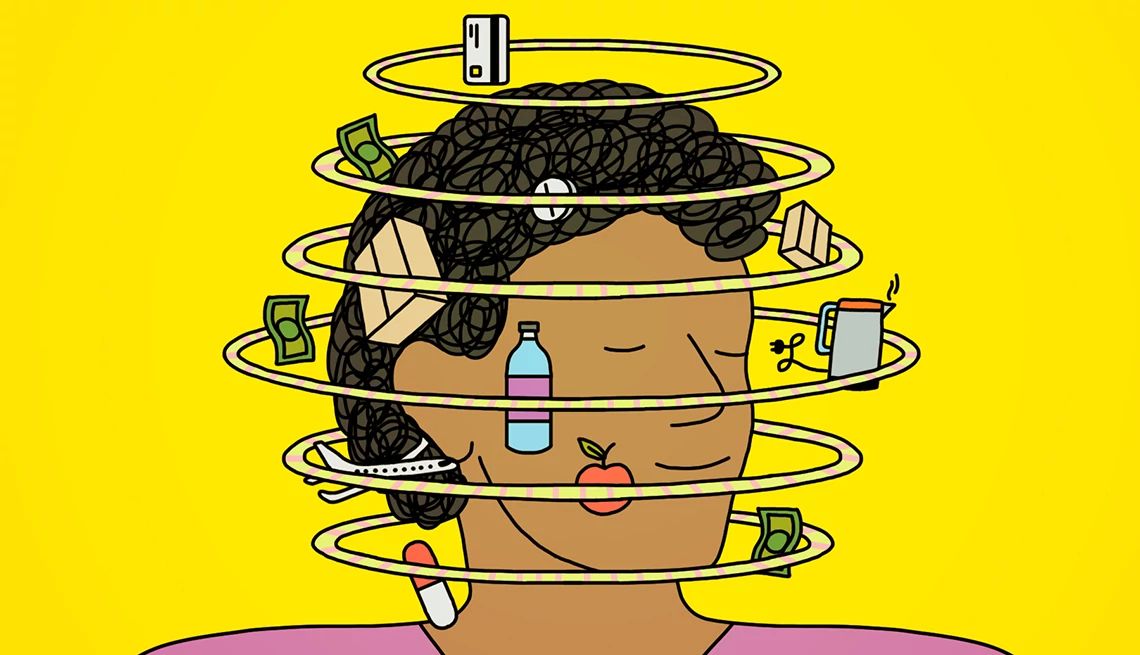
AARP Solves 25 of Your Problems
Driver Safety
Maintenance & Safety
Trends & Technology

AARP Smart Guide
How to Clean Your Car

We Need To Talk
Assess Your Loved One's Driving Skills

AARP Smart Driver Course

Building Resilience in Difficult Times

Tips for Finding Your Calm

Weight Loss After 50 Challenge

Cautionary Tales of Today's Biggest Scams

7 Top Podcasts for Armchair Travelers

Jean Chatzky: ‘Closing the Savings Gap’

Quick Digest of Today's Top News

AARP Top Tips for Navigating Life

Get Moving With Our Workout Series
You are now leaving AARP.org and going to a website that is not operated by AARP. A different privacy policy and terms of service will apply.
Go to Series Main Page
Safe Travels: Pack These Items to Keep You and Your Things Free From Harm
These objects can warn you of invisible dangers and protect against theft and injury.
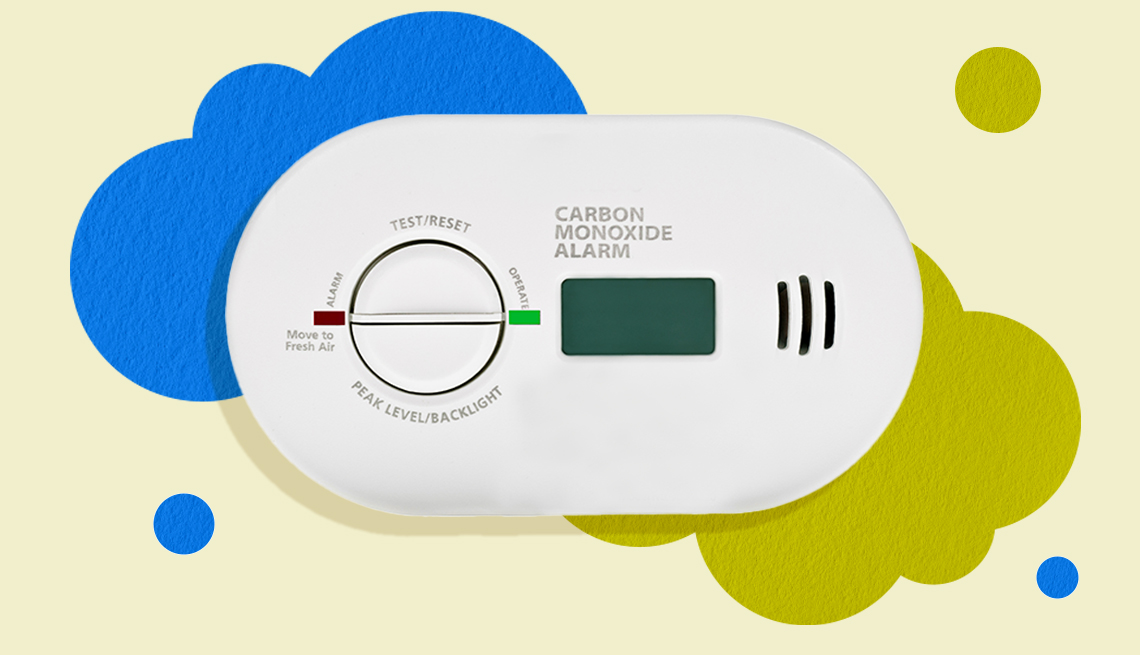
Jenna Gyimesi and Niamh Rowe,
These days it can appear that danger lurks around every corner. Before you throw up your hands and decide never to leave home, consider these devices and tools that can help keep you safe while traveling.
Carbon monoxide detector
About a quarter of U.S. homes now have a carbon monoxide (CO) detector , and the U.S. Consumer Product Safety Commission recommends that everyone get this safety device to warn against the invisible, noxious gas. But what about when you’re traveling? As CO detectors are not widespread, you could be putting yourself at risk if a furnace or other fuel-burning appliance has not been properly maintained.

Get instant access to members-only products and hundreds of discounts, a free second membership, and a subscription to AARP the Magazine.
That’s why Eunice Wlcek, 61, who offers travel tips on her Theory of Simple YouTube channel, brings a portable CO detector when traveling (they cost as little as $25). “You want to make sure, especially in the winter, that there’s not an issue.”
According to the Consumer Product Safety Commission, CO levels of up to 70 parts per million will usually not cause symptoms. But levels above 70 ppm can cause headaches, nausea and fatigue. Concentrations above 150 ppm can lead to brain damage or death. Older people, young children and people with lung or heart disease are most at risk.
Here’s what to look for in a portable CO monitor, according to Charon McNabb of the National Carbon Monoxide Awareness Association and John D’Alessandro of the Firefighters Association of the State of New York:
- Battery power, in case there’s no convenient outlet.
- Meets specifications of a reputable testing laboratory such as Underwriter Laboratories Inc.
- A display that’s always on. Readings should be visible without your having to “wake” the device.
- A readout that displays parts per million in real time, meaning it shows current levels and not an average over time.
- A “max button,” which you can press to display the highest reading since you last checked. In the morning, you could see the highest amount you were exposed to overnight.
ARTICLE CONTINUES AFTER ADVERTISEMENT
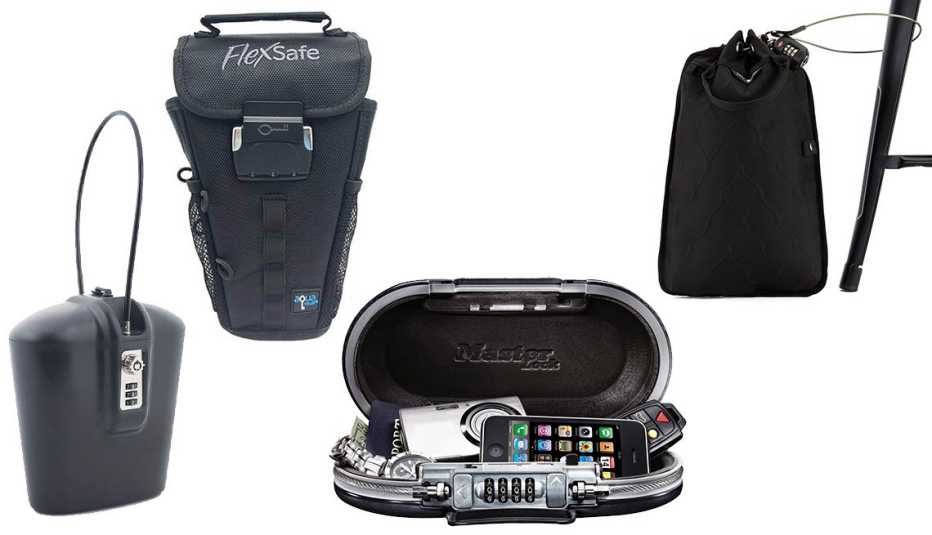
Portable safe
Portable safes (about $50 to $100) are helpful if you’re staying in a rental home or if your hotel only has a lobby safe but no room safes (call ahead to check). “You don’t want to keep going back and forth down to the front desk to get access to your valuables,” says former Los Angeles police detective Kevin Coffey, who now works as a travel safety expert. Soft models shaped like a shoe bag are light to pack and easily rolled up, Coffey says. Make sure that it comes with a steel cable so you can attach the safe to a fixed object that won’t break. Portable safes can also be used for locking up valuables in your parked car or fixing to a permanent poolside fixture when going for a dip.
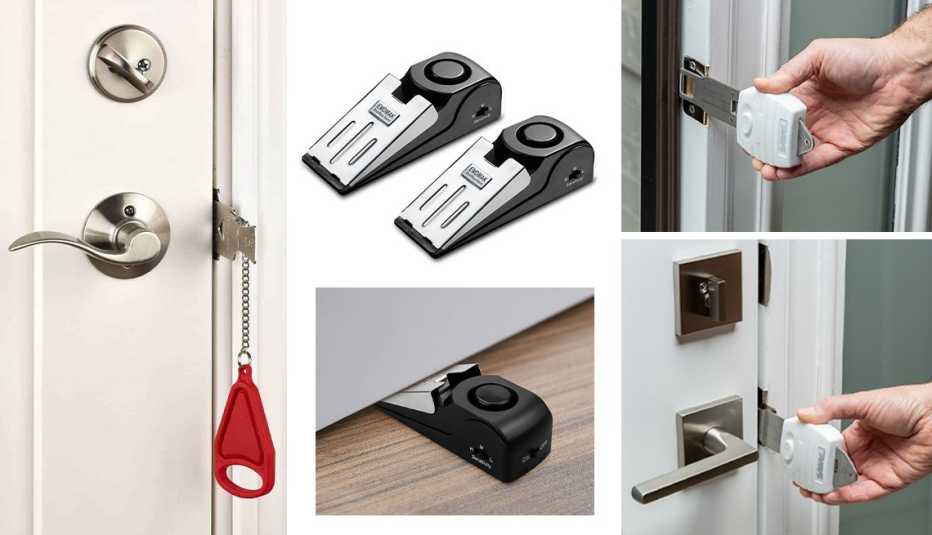
Additional door lock
Coffey asks travelers this: Have you ever accidentally walked into the wrong hotel room or had someone enter your room, catching you off guard? The answer may be yes. “Hotels make mistakes; they double-book rooms, they give out other keys by mistake,” he says. And in his work with the LAPD, he’s come across thieves using illicit devices to open room doors by interfering with the electronic key port. Also, if you’re staying in an older rental that only has single locks, or a boutique hotel without modern key cards, an additional lock adds another layer of protection.
Holland America Line
Up to $200 onboard credit on select cruises
A portable lock (under $20) attaches from the inside and ensures the door will stay locked even if someone has a key to your hotel door. A metal plate is placed on the door’s inside. Then a wedge attaches to the plate and prevents the door from being opened from the outside. Travel industry expert John DiScala, who also goes by the name Johnny Jet, recommends a simple triangular doorstop (under $10) you slide underneath, which makes it more difficult for an intruder to open the door while you’re in the room.
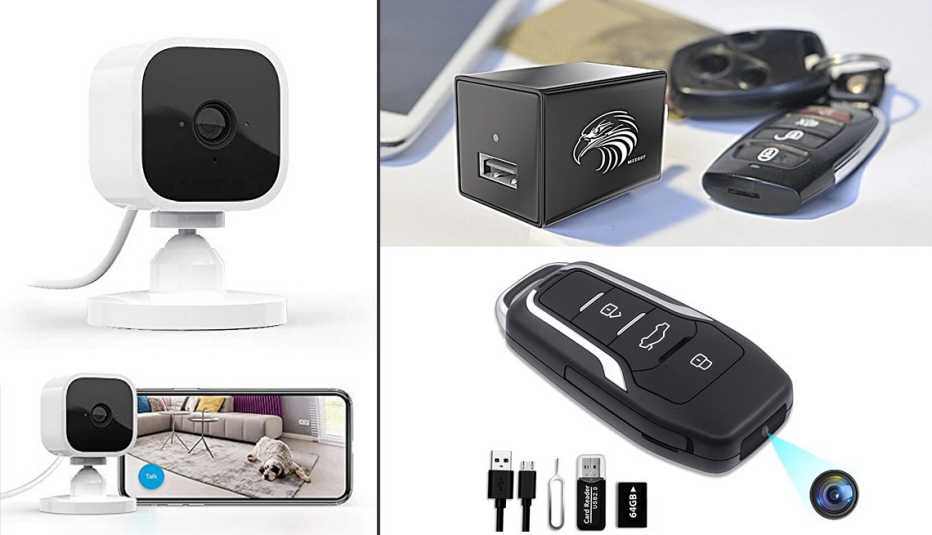
Portable security camera
A portable security camera ($20–$60) could provide answers to missing items in your hotel room (but check with the hotel first to see if it allows them). Look for models with wireless connection if you’d like to watch the camera’s live feed from your iOS or Android device. Choose a camera that stores footage on an SD (memory) card, so you can review past events and save recordings for future evidence. You can also use a camera that’s disguised, says Terika L. Haynes, CEO of Dynamite Travel, such as one that looks like a key fob or wall charger. Some models are magnetic, so they’re easy to stick on any metal surface.
Personal safety alarm
Alarms that fit in your pocket ($30 or less) activate a siren when you press a button or pull out the pin. “The higher the decibel level, the better,” says security expert Lloyd Figgins. Alarms come in a variety of colors and can attach to your key ring.
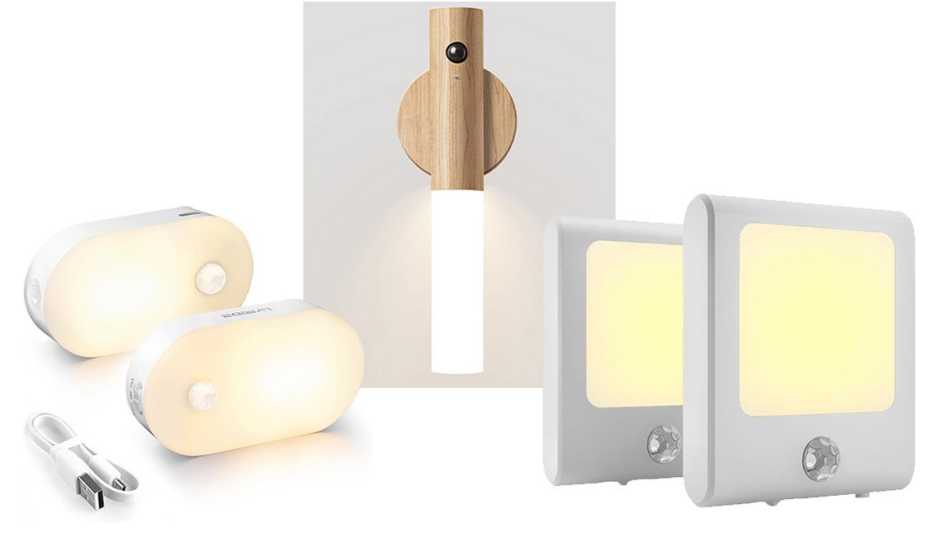
Motion sensor night-light
Night-lights ($20–$50) are useful if you’re worried you might trip when going to the bathroom at night in an unfamiliar room with blackout curtains, says Haynes. These motion sensors plug into any wall socket, but Jet also recommends magnetic lights that can attach to a metal surface.
“It’s a brilliant piece of equipment,” says Figgins. “It’s just got 101 different uses.” He’s used duct tape (about $5) to fix a hole in a shoe, help splint broken limbs in an emergency and even fix a car’s radiator hose. You can also use duct tape for repairing glasses on the go, covering blisters or mending a tent. Figgins wraps some duct tape around an old library card or credit card to avoid carrying a large roll.
Fanny packs and travel vests
Jet swears by clothing and accessories that carry your valuables on your body. These can include the traditional money bag that straps around your waist (under $50) or a pocketed vest ($50–$200). With pockets hidden all over your torso, a vest fits like armor against pickpocketing. “You can even put your laptop in it,” he says. The pocketed vest also works nicely as a sort of secret extra carry-on bag when boarding a flight.
Jenna Gyimesi, a former associate editor for AARP The Magazine and AARP Bulletin, is a contributing writer who also covers technology and finance for Business Insider. Niamh Rowe is the associate editor for AARP The Magazine. She covers consumer issues and technology, and her work has been featured in Wired, The Guardian, Dazed and The Daily Beast . Previously, she produced a podcast for the Financial Times .
Discover AARP Members Only Access
Already a Member? Login
MORE FROM AARP
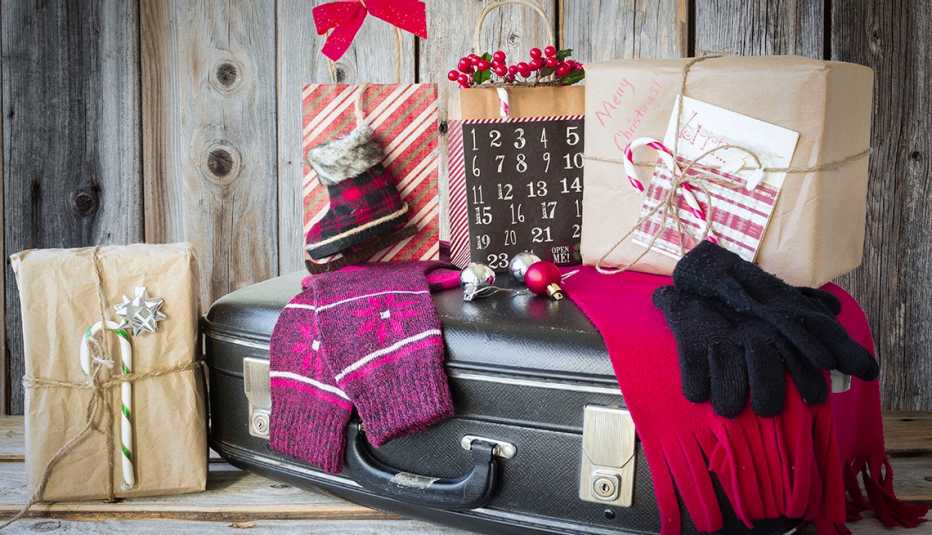
Quiz: You Can’t Bring That on a Plane … Or Can You? Holiday Edition
Take our quiz to see what festive items will fly in your carry-on, according to the TSA
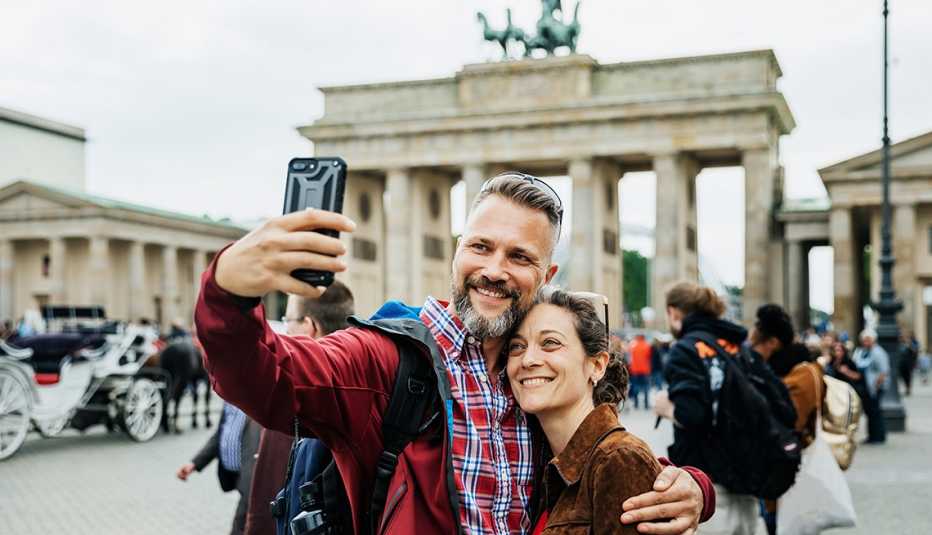
7 Steps for Staying Safe When U.S. Issues Travel Advisories
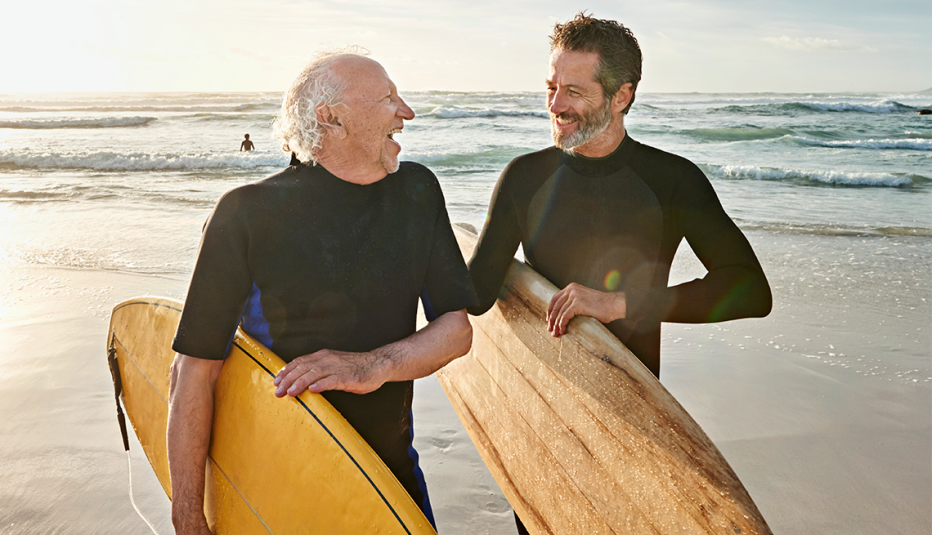
6 Steps to Planning a Successful Trip With Your Older Parent
Start the process early and consider a tour guide to keep everyone engaged
Or Call: 1-800-675-4318
Enter a valid from location
Enter a valid to location
Enter a valid departing date
Enter a valid returning date
Age of children:
Child under 2 must either sit in laps or in seats:
+ Add Another Flight
Enter a valid destination location
Enter a valid checking in date
Enter a valid checking out date
Occupants of Room
Occupants of Room 1:
Occupants of Room 2:
Occupants of Room 3:
Occupants of Room 4:
Occupants of Room 5:
Occupants of Room 6:
Occupants of Room 7:
Occupants of Room 8:
Enter a valid date
You didn't specify child's age
There are children in room 1 without an adult
You didn't specify child's age for room 1
There are children in room 2 without an adult
You didn't specify child's age in room 2
There are children in room 3 without an adult
You didn't specify child's age in room 3
There are children in room 4 without an adult
You didn't specify child's age in room 4
There are children in room 5 without an adult
You didn't specify child's age in room 5
You have more than 6 people total
Please select a trip duration less than 28 days
There must be at least 1 traveler (age 12+) for each infant in a lap
Enter a valid From location
Enter a valid start date
Enter a valid drop location
Enter a valid drop off date
Select a valid to location
Select a month
Enter a valid going to location
Enter a valid from date
Enter a valid to date
AARP Value & Member Benefits

HX: Hurtigruten Expeditions
5% off cruise fares and a €100 per person onboard credit
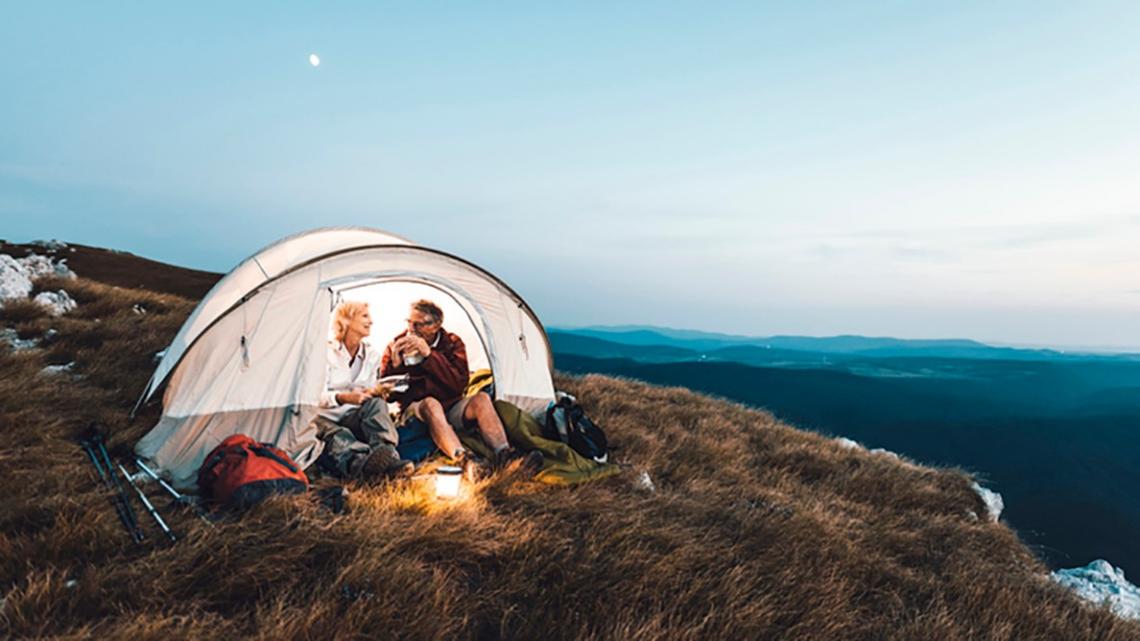
AARP Vacation Ideas
Ideas for every type of trip – from cruises to road trips
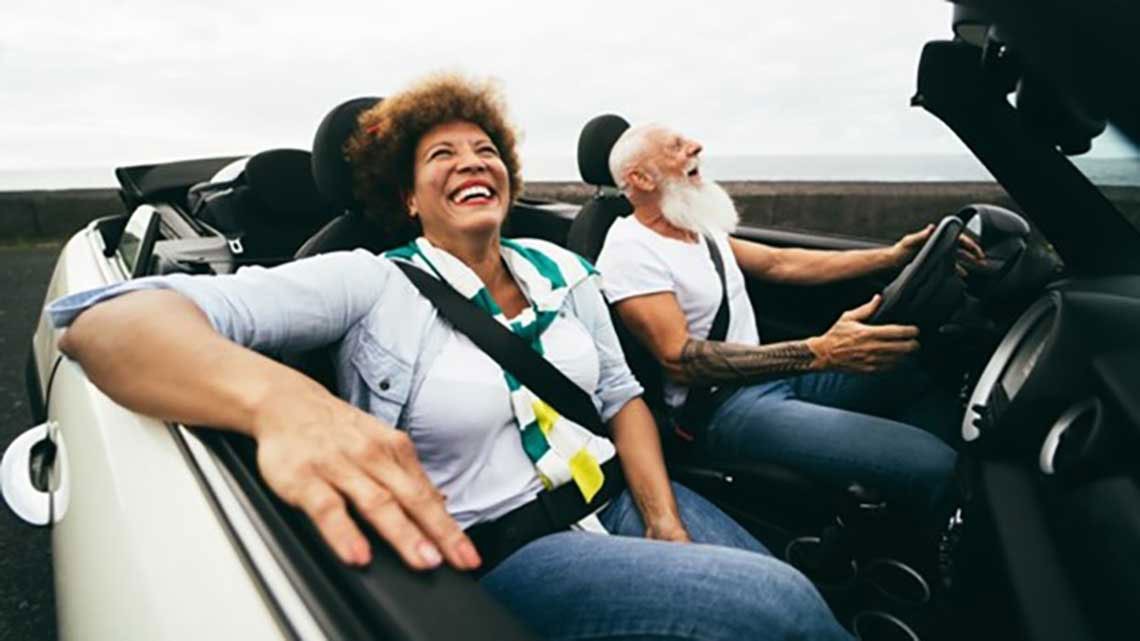
AARP Travel Center Powered by Expedia: Car Rentals
Up to 30% off select car rentals

AARP® Staying Sharp®
Activities, recipes, challenges and more with full access to AARP Staying Sharp®
SAVE MONEY WITH THESE LIMITED-TIME OFFERS

Travel safety: 17 CIA tips, advice to think like a spy on vacation
Editor's note: This story was originally published on July 9, 2022.
TEL AVIV, Israel – Before I hit the bike path for a long sightseeing excursion in this international hotspot, dressing down in muted colors, a nondescript baseball cap and a relatively cheap watch and shoes was as second nature to me as applying sunscreen.
As a longtime national security journalist who has traveled to some of the world’s grittiest corners, I learned long ago to make sure I’m that person who doesn’t stick out in a crowd and become a target for thieves, terrorists, or kidnappers – whether I’m on an assignment or a family vacation.
Start the day smarter. Get all the news you need in your inbox each morning.
Central Intelligence Agency operatives on assignment overseas call it “being the gray man” who blends in and doesn’t alert the world to their American citizenship and all of the assumed wealth and baggage that can bring. I learned about this valuable safety tip during many “Hostile Environment Training” courses I’ve taken over the decades, including some I helped design for young journalists flying off to destinations overseas.
Live updates: Israel orders 'complete siege' of Gaza; at least 9 Americans killed
'We have to be on guard a lot': Why safety comes first for so many LGBTQ travelers
I was already thinking of brushing up on my travel safety tips when preparing to come to Tel Aviv when I happened upon a new CIA web posting with advice from its officers on how to travel safely and with confidence.
The CIA released these tips – or travel tradecraft, in spy parlance – as part of its ongoing effort to demystify its work in assisting the American public, according to agency spokesperson Walter Trosin.
I found the CIA's best practices, culled from the experience of its officers in the field, are exceptionally helpful, easy to adopt and especially relevant to Americans in these fraught times.
Here’s how to think like a spy on the ground overseas, with some annotation based on my travels as anything but an American James Bond:
Objective one: Getting there
▶ CIA tip: Make a paper and digital copy of your passport. While traveling abroad, it might literally be your ticket home if problems arise. If a hotel desk clerk asks to hold on to your passport, see if they’ll accept the paper copy. While you’re at it, write down some important phone numbers on the hard copy, including emergency contacts and the local U.S. embassy just in case.
Josh's tip: Email yourself the digital copy in case your phone goes missing along with your passport.
▶ CIA tip: Register with your embassy. Think of it as establishing communications with your home base. This enables embassy staff to contact you if there’s an emergency or unfolding crisis. U.S. citizens can also sign up with the State Department’s Smart Traveler Enrollment Program .
▶ CIA tip: Learn some local lingo. Bring a pocket guidebook or phone app so you can pick up key words and phrases.
Josh's tip: My go-to essentials include “thank you,” “please,” “hello,” “goodbye,” “yes/no,” “help,” “bathroom” and “police.” In worst-case scenarios, yelling out “no cash” helps if you believe you might be getting robbed, and “medic” and “hospital” if someone is hurt.
▶ CIA tip: Know your destination. Bone up not just on travel books but also try to get a sense of the place and the geopolitical issues at play there. The CIA World Factbook is very helpful and publicly available for basic information. The CIA's World Factbook team also has created special travel briefings for many countries.
Josh's tip: Look up the State Department Travel Advisories for your destination, though they often tend to be overly scary and alarmist.
▶ CIA tip: Scout out local transportation. Upon arrival, ask an airport official or travelers’ aide how much it should cost to catch a public shuttle or taxi to your hotel. Check online sites too. Be sure to negotiate the taxi price before loading your baggage and getting inside. Only use cabs from the official queue – or ride-hailing services from official apps – that are clearly marked and have a functioning meter and the driver’s ID displayed inside.
Josh's tip: Ask ahead of time if they take credit cards or American currency. Even better, stock up on the local currency, preferably at an ATM where you can use a credit card that gets you a better rate than the money changers at the airport.
▶ Josh's tip: Keep all your luggage close. This is especially the case when getting to and from your hotel. Bags can disappear at the luggage carousel, the taxi stand, hotel lobby, or any number of other places.
Story continues below.
Objective two: Settling in
▶ CIA tip: Know your escape route from your hotel room too. Familiarize yourself with emergency evacuation plans. And do a run-through to determine how many doors there are between your room and the nearest stairwell. Could you find it in the dark? While holding your breath in a smoky haze?
▶ CIA tip: Use the elevator, unless it’s an emergency. Using the stairs may be great for exercise, but crimes frequently occur in isolated stairwells.
▶ CIA tip: Try to reserve a room on a middle floor. Being on the ground floor can leave you vulnerable to break-ins, but many countries’ emergency response personnel aren’t equipped to reach higher than a few floors off the ground.
Josh's tip: If you’re in a particularly strife-torn locale, consider a room in the back of the hotel if you’re worried about car bombs or terrorist attacks. And just know that in some hotspots, bad actors will target hotel restaurants and other places where tourists congregate.
▶ CIA tip: Lock it up. Automatic locks on hotel room doors can often be forced open, and the chains cut. Use the deadbolt if there is one. Better yet, invest in a cheap and easily portable rubber doorstop; they work amazingly well.
▶ CIA tip: Beware of unsolicited knocks. Don’t open your hotel door unless you know or can verify who’s on the other side. Be especially wary of unrequested special delivery, maintenance calls, turndown service, or room service. Don’t be shy about calling the front desk to confirm.
Objective three: Going out and about
▶ CIA tip: Lock it down. Whether renting a car or taking a taxi, lock the doors and keep the windows rolled up if you sense any danger – or crowds. Carjackers and snatch-and-grab thieves often prey on simple mistakes like an open door or window.
▶ Josh's tip: When using Uber, Lyft and many other ride-hailing apps, make sure you are getting into the correct car. If something feels wrong, don’t get in.
▶ CIA tip: Stay alert. CIA officers (the real term for overseas spies, not agents) are trained to be highly attuned to their surroundings to constantly maintain situational awareness. Use all five senses to pay attention to what’s happening around you, and you’ll not only spot telltale signs if something is amiss but retain more of your destination’s unique atmosphere.
Josh's tip: You don’t always need to sit with your back to the wall like Jason Bourne but being able to see the entrances – and know the exits – is important if you need to get out quick.
▶ CIA tip: Be mindful when drinking adult beverages. Spies might swill martinis in the movies, but alcohol impairs alertness and judgment and could put you at risk, especially in an unfamiliar country. Learn the local customs and restrictions on alcohol consumption and follow them closely.
Josh's tip: Make sure you can see your drinks being poured and transported to you to make sure no one is adding any intoxicants. Avoid using or purchasing recreational drugs even if locals insist they’re safe and legal.
▶ CIA tip: Walk the walk. Your confident demeanor on the street is often the best deterrent against criminals. Be the gray man or woman and you won’t look like an easy target. Don’t attract attention by looking confused, lost, or distracted. Avoid poring over maps and phone apps in busy areas. And don’t be flashy. Flaunting extravagant watches and other personal items or cash will attract thieves and opportunists.
▶ CIA tip: Plan your route and reroute as necessary. Whether traveling by foot, car, or public or private transit, prepare in advance. Bone up on the potentially dangerous parts of town so you can avoid them. Don’t walk alone at night, stick to well-lit areas that aren’t too isolated if you can and know the number of the local authorities just in case. Avoid crowd commotion, as it could mean escalating danger or even a distraction designed to help someone target you.
Josh's tip: Carry an emergency whistle handy to scare off potential assailants.
With these tips, I spent the day biking throughout Tel Aviv and the nearby port of old Jaffa, home to a vibrant multiethnic community of Muslims, Christians, and Jews. The city was on edge a bit due to a recent wave of terrorist attacks , but I thoroughly enjoyed my time chatting up the locals and sampling their food and drink knowing I was doing everything I could to stay safe.
This article originally appeared on USA TODAY: Travel safety: 17 CIA tips, advice to think like a spy on vacation


An official website of the United States government
Here’s how you know
Official websites use .gov A .gov website belongs to an official government organization in the United States.
Secure .gov websites use HTTPS A lock ( Lock A locked padlock ) or https:// means you’ve safely connected to the .gov website. Share sensitive information only on official, secure websites.
TSA's Top Travel Tips
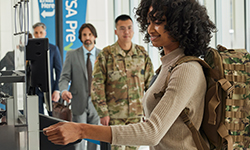
TSA partnered with Stars and Stripes News for special military guide
The special guide for service members and their families includes travel tips, such as how to prepare, pack and declare a firearm, checkpoint dos and don’ts, and an inside look at some of TSA’s programs and employees, with a special military emphasis.
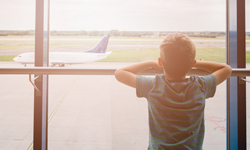
Kids rule the airport!
Traveling with children. Those words can strike fear in the hearts of even seasoned travelers. How does one prepare for the ‘excitement’ of bringing young travelers to the airport? We have the answer to three of the most common issues.
Strollers, car seats, breastmilk, oh my!
It can be stressful traveling with baby gear any time of year. Check out this video for tips on navigating through the security screening process with these items. And don’t forget, if you need assistance – just ask – we’re happy to help!
Refresh your memory on the liquid rules
We all know by now that a turkey sandwich is not a liquid, but it can still be confusing when you’re figuring out how to pack your liquids. Watch this video and it will all be crystal clear.
TSA PreCheck® = game changer
Who doesn’t want to get through security faster? TSA PreCheck® allows you to do just that. It’s quick and easy security screening for travelers we know more about – and have earned the esteemed title of “Trusted Traveler.” Applying is easy and once you’re a member- you’ll never want to go back.
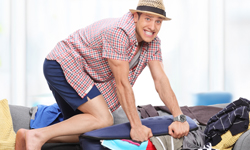
How not to be “That Guy” at the airport checkpoint
If you’re like most travelers, you likely don’t like to hear the sound of tapping feet and heavy sighs as your fellow travelers wait for you to prepare your items for security. Want to get through security as fast as possible, while still being safe? Check out these tips for domestic travel from your friends at TSA.

Can you pack your meds in a pill case and more questions answered
One of the more popular questions we get from travelers is: “Can I travel with my medication?” The answer is yes, with some qualifiers. Here are a few tips that you might find helpful.

How to know you’ve forgotten something at the checkpoint
Ever gotten on a plane and felt like you were missing something? Here’s a list of the most common items left behind at the security checkpoint. Take note, so it doesn’t happen to you!

Taking your human on a plane: what every pet needs to know
Hey, down here! Are we going to the airport again? No big deal… we’re in this together, and that means we both have to go through security screening.
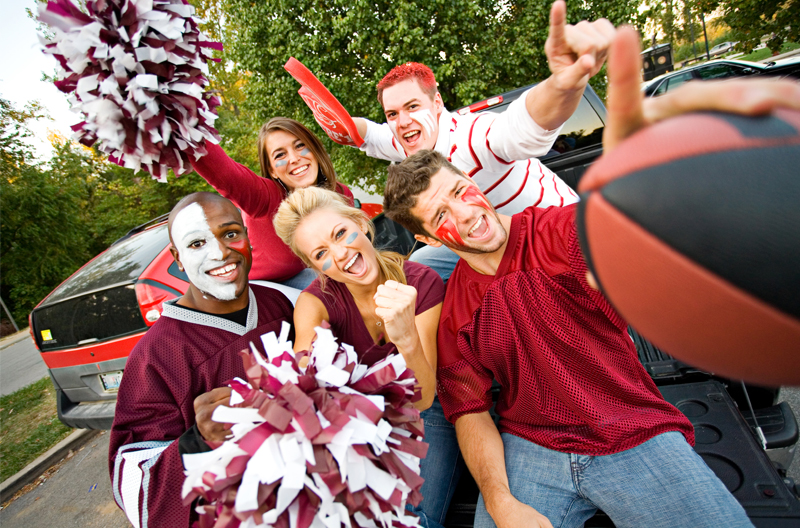
Get Ready for Game Day
Ah, fall! A time for falling leaves, cooling temperatures, and pumpkin spice flavored everything. But for sports fans, fall means the return of football. Players at all levels, from pee wee to the pros, will be taking the field once again. And if you’re traveling to see the Tide roll or the Eagles soar, we have some tips to help you avoid a penalty flag during your airport screening experience.

Travel Tips that Your Mama Will Love
Everyone knows that there’s no sweeter gift for mom than a visit from you! But if you must bring along a gift, we have a few dos and don’ts to make sure your screening experience is a smooth one.

Fashion dos and don’ts while going through the checkpoint!
Avoid a fashion faux pas by forgetting to do this on your next airport visit.

Keep the Change
Pennies, nickels and dimes don’t seem like much… just a jiggling in your pockets, right? Every day, thousands of people leave their loose change at TSA security checkpoints across America. You may think that a few pennies don’t add up to very much. Just wait until you find out how much passengers leave in those checkpoint bins!

You’ll kick yourself if you forget these travel tips!
Millions of people from all over the world are tuning in to this year’s World Cup. Summer travel season is in full swing so be sure to be ahead of the game when traveling. Shoot and score with these helpful tips that will help you dribble through security with ease.

Going GREEN while traveling through airport security!
Earth Day is every day for TSA. You can do your part to help our planet with these green-friendly travel tips.

Feel like a Superhero with these ASTONISHING travel tips!
Dust off your comic books and cosplay outfits and make room on your shelves for even more cool collectibles! The Granddaddy of annual comic conventions is HERE! Here are 4 helpful tips for all the fanboys and fangirls out there!

5 stressors every pregnant woman has at the airport
Traveling at any time can be stressful, but it can be even more challenging when you’re pregnant.

Too cool for school
The time has come for students to head back to class. If you’ll be flying off to school, we have some tips to make your back-to-school travels as stress-free as possible. After all, nothing should cause you stress other than your first exams and textbook costs!
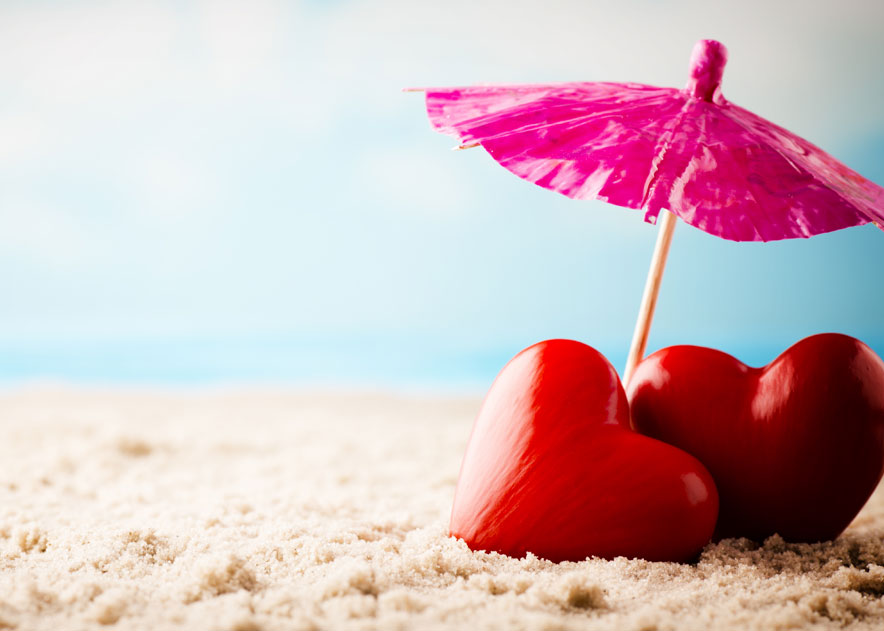
Two Carry-on Bags in Paradise: A Love Story
If loving a safe flight is wrong, then we don’t want to be right! Valentine’s Day is almost here and many of us will be traveling with gifts for the one we love. Check out some of the most common items screened at security checkpoints nationwide during this romantic time of year.

When flying on a broom just won’t do
Hello all you ghouls and ghosts! It’s almost that bewitching time which means you’re probably itching to hop onto your brooms and fly to a Halloween adventure from your local airports. Here are the tips to make sure your trick-or-treating in the airports is just as sweet as your bucket of candy (without all of the cavities).
Summer Blockbuster -- Automated Screening Lanes coming to an airport near you
Automated Screening Lanes are a state-of-the-art checkpoint technology that enhances security efficiency while decreasing the amount of time travelers spend during the security screening process. These lanes are currently in airports in New York, Los Angeles, Las Vegas, Dallas, Chicago, Minneapolis, Miami, Houston, Newark, Seattle and Atlanta.

Turkey trot on your way through the airport
Thanksgiving is a time for joy, a time for family, and of course a time for glorious, sumptuous, food! Traveling with these mouth-watering dishes, can sometimes be tricky, so find out what you can pack and what you should leave behind at home.

The Spirit of the Season
Hanukkah, Christmas and Kwanzaa all begin in December. No matter the religious holiday, TSA has tips for items that you may be traveling with in celebration of the season.

Fly Like Rudolph for the Holiday Season
Deck the moving walkways with your jolly selves as you venture off to your cozy destinations this holiday season! Since traveling with festive fare can sometimes be tricky, check out our tips below to make sure you and your fellow elves make it through the security checkpoint in a mistletoe minute.
Summer Driving Tips
Summer changes, vehicle checks, before you go, protect yourself and loved ones, year-round safety.
Summertime usually means vacations and summer road trips. Now is a good time to review these summer driving safety tips. A little planning and some safety checks might spare you from dealing with the consequences of a breakdown — or worse, a highway crash.
Air Conditioning
As the temperature rises, your A/C works harder to keep your vehicle cool. Check A/C performance before traveling; don’t forget to check your cabin air filter, too. A lack of air conditioning on a hot summer day affects everyone and is particularly dangerous for people in poor health or who are sensitive to heat, such as children and older adults.
The summertime months are especially deadly for children when it comes to hot car deaths. Heatstroke in vehicles happens when a child is left unattended in a parked vehicle or manages to get into an unattended vehicle. Never leave children alone in the car — not even for a minute. A child’s body temperature rises three to five times faster than an adult. Even if the outside temperature is as low as 60 degrees and the windows are cracked, the temperature inside a vehicle can rapidly reach deadly levels.
Visit NHTSA.gov/Heatstroke to learn more tips and reminders to prevent heatstroke.
Belts and Hoses
High summer temperatures accelerate the rate at which rubber belts and hoses degrade. Look under the hood and inspect all belts and hoses to make sure there are no signs of bulges, blisters, cracks, or cuts in the rubber. It’s best to replace them now if they show signs of obvious wear. Also, make sure all hose connections are secure.
Check for Recalls
NHTSA's Recalls Look-up Tool lets you enter your license plate or vehicle identification number (VIN) to quickly learn if your vehicle has a critical safety issue, and, if so, steps for free repairs. You can also download NHTSA’s SaferCar app and enter your vehicle and equipment information. If a recall is issued, you’ll get an alert on your phone.
Make sure each tire is filled to the vehicle manufacturer’s recommended inflation pressure, which is listed in your owner’s manual and on a placard located on the driver’s door pillar or door frame; and don’t forget to check your spare if your vehicle is equipped with one. To get an accurate reading, check pressure when tires are cold, meaning they haven’t been driven on for at least three hours. Do not inflate your tires to the pressure listed on the tire itself — that number is the maximum pressure the tire can hold, not the recommended pressure for your vehicle. A tire doesn’t have to be punctured to lose air; all tires naturally lose some air over time. In fact, underinflation is the leading cause of tire failure. Some other tips:
- Inspect your tires at least once a month and before long road trips.
- Look closely at your tread and replace tires that have uneven wear or insufficient tread.
- Tread should be at least 2/32 of an inch or greater on all tires. Look for the built-in wear bar indicators or use the penny test to determine when it’s time to replace your tires. Place a penny in the tread with Lincoln's head upside down. If you can see the top of Lincoln's head, your vehicle needs new tires.
- If you find uneven wear across the tires’ tread, it means your tires need rotation and/or your wheels need to be aligned before you travel.
- Check each tire’s age. Some vehicle manufacturers recommend replacing tires every six years regardless of use.
- Since electric vehicles are typically heavier than gas-powered vehicles, they require EV-specific tires to bear the weight, maximize performance and electric range, all while minimizing tire noise. Whether the vehicle is gas-powered, electric-powered, or a hybrid, all tires require similar maintenance. Low-rolling-resistance tires for conventional vehicles could also have lower tread life.
An inspection is not just about checking tire pressure and age. Remember to check:
- for any damage or conditions that may need attention;
- the tread and sidewalls for any cuts, punctures, bulges, scrapes, cracks, or bumps. The tread should be at least 2/32 of an inch or greater on all tires; and
- your spare tire and car jack kit.
If you find tire damage, take your vehicle to a tire professional.
Cooling System
Make sure you have enough coolant inside your vehicle, and that the coolant meets the manufacturer’s specifications. Check your vehicle owner’s manual for specific recommendations. You or a mechanic should check the cooling system for leaks, test the coolant, and drain or replace old coolant as needed.
Fluid Level
If you drive a conventional vehicle or a hybrid, be sure to check your vehicle’s oil level periodically. If it’s around the time to have the oil changed, now would be a good time to do it. Also check fluid levels in the following:
- automatic transmission or clutch
- power steering (if hydraulic)
- windshield washer
Make sure each reservoir is full; if you see any signs of fluid leakage, take your vehicle in to be serviced. Remember, if you drive an electric vehicle, be sure to check applicable fluid levels, too!
Have a mechanic check your battery and charging system, and make any necessary repairs or replacements. For hybrid-electric vehicles, keep gasoline in the tank to support the gasoline engine.
Visit NHTSA’s Hybrid and Electric Vehicle guide for more information on high-voltage batteries.
Check your headlights, brake lights, turn signals, emergency flashers, and interior lights. Be sure to also check your trailer brake lights and turn signals, if necessary.
Wiper Blades
After the heavy toll imposed by winter storms and spring rains, windshield wiper blades may need to be replaced. Like rubber belts and hoses, wiper blades are vulnerable to the summer heat. Examine your blades for signs of wear and tear on both sides. The blades can also deform and fail to work properly in both directions. If they aren’t in top condition, invest in new ones before you go.
Improperly installed floor mats in your vehicle may interfere with the operation of the accelerator or brake pedal, increasing the risk of a crash. Follow the manufacturer’s instructions for mat installation and use retention clips to secure the mat. Always use mats that are the correct size and fit for your vehicle.
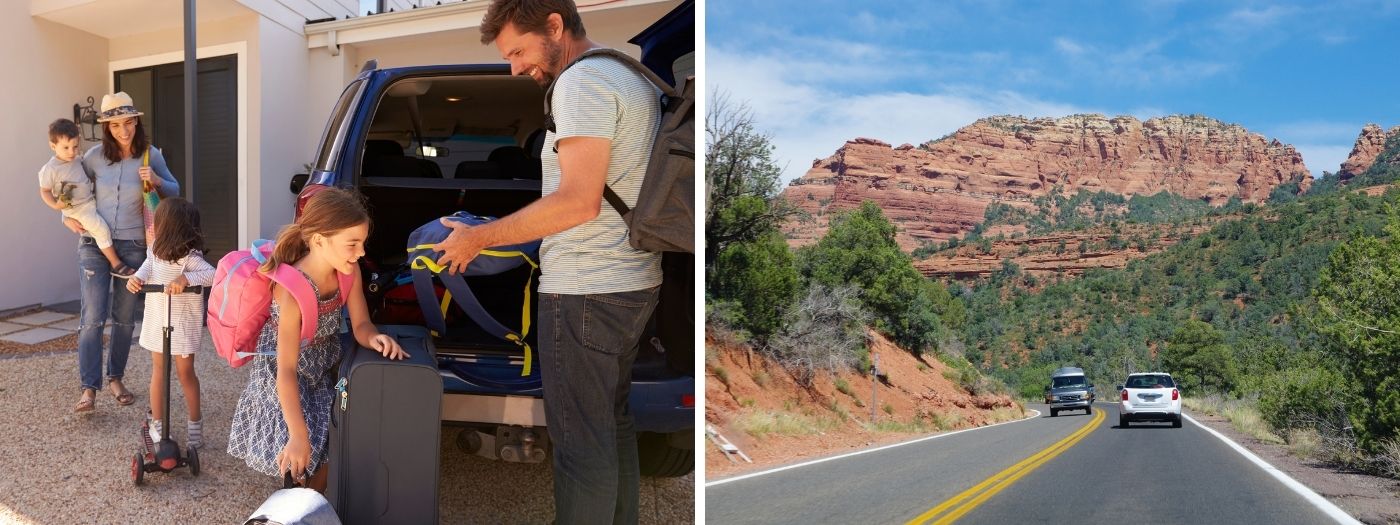

IMAGES
VIDEO
COMMENTS
Stay safe on your next trip with these essential tips! Full list here: https://happytowander.com/travel-safety-tips/Follow me on Instagram: https://instagram...
In this video, I give 11 travel safety tips that could help keep you safe during your next ... Are you traveling domestically or internationally any time soon? In this video, I give 11 travel ...
Travelling to a foreign land is an incredibly fulfilling and enlightening experience which everybody should try at least once in their lives. And when travel...
Shop for Travel safety essentials: https://urlgeni.us/amazon/SafetyWhether you're headed out on a cruise or venturing ashore on a land vacation, you should ...
More and more travel w/Sonia every Thursday:http://bit.ly/SoniasTravelsYTSonia Gil shares her travel tips for staying safe when traveling. Watch more of my A...
We're in the thick of travel season. Whether you're going overseas or across the border, you need to be aware of the potential risks and how to properly prot...
4: Lock Up Your Valuables. Lock Up Expensive Stuff. Putting aside the fact that traveling with anything super valuable is usually a bad idea, there will always be something you absolutely cannot afford to have stolen. I travel with a lot of expensive camera gear for example.
Post #covid19 pandemic, #travelers' safety has become a priority for companies. Therefore, they are taking many steps to ensure travelers remain safe on busi...
#shorts #for_you #trending Travel Safety Tips | Safe Travel GuideKeywordsTravel Safety TipsSafe Travel GuideTravel PrecautionsTravel AdviceSafety Measures fo...
The following travel activities are ranked on a scale of 1 to 10 by infectious disease experts according to risk of exposure to the virus (first number from Fall 2020*, second italicized numbers for fully vaccinated people as of April 2021*):. Low Risk: - Going camping (2, 1) - Getting restaurant take-out (2, 1) - Pumping gas (2) - Grocery shopping (3, 1.4)
Adventurous Miriam earns a small commission at no extra cost to you if you purchase through my links. I appreciate your support ♡ Learn more. Travel safety tips for all travelers. 1. Always have this in your carry-on bag. 2. Choose a safe bag. 3. Research common scams.
Additionally, consider bringing a backup credit card. 8. Be careful with public Wi-Fi. Wi-Fi can open your devices and sensitive information to hackers. Using a VPN service is one of the best ways ...
This will give you invaluable insight into what to expect and how to prepare for the time period you plan to travel there. 3. Check Government Websites. Entrance to the Egyptian Museum in Cairo. Another of our top safety tips for travel is to check government websites before you travel.
Generally, foods served hot are usually safe to eat as well as dry and packaged foods. Bottled, canned, and hot drinks are usually safe to drink. Learn more about how to choose safer food and drinks to prevent getting sick. Protect yourself from the sun. Apply sunscreen with SPF 15 or higher when traveling.
Our top travel safety tips will help you protect yourself (and your things), avoid common scams, stay safe, and more(!) as you travel the world. With things finally getting back to normal after over 2.5 years of a global catastrophe, everyone is excited to pack their bags and hit the road. Admit it; you'd be lying if you said you didn't ...
Rick Steves' travel tips help maximize your time and money spent in Europe and beyond. Travel Tips topics include packing, planning, safety, tourist scams, transportation, money, sleeping, and much more.
More Travel Safety Tips Be Cautious On Public Wi-Fi. Digital travel safety tips are often overlooked. Public Wi-Fi carries all sorts of risks. If whoever set up the Wi-Fi didn't do so correctly, it's far easier for a hacker to infiltrate your data than you may realize. So, whenever you use public Wi-Fi, be sure to also log into a VPN ...
From left: Addalock: The Original Portable Door Lock ($18-$30, addalock.com); EMDMAK Door Stop Alarm with 120DB Siren ($14 for two, amazon.com); Sabre Portable Door Lock with travel bag ($20, sabrered.com). Courtesy Addalock; EMDMAK; Sabre.
Essential Travel Safety Tips for Trips. 1. Buy travel insurance! Safety Wing / Safety Wing. Our first travel safety tip is to buy travel insurance! This is particularly important when traveling abroad, as your typical health insurance may not cover you in a foreign country. Our favorite travel insurance company here at ViaTravelers is Safety ...
44: Make Friends With Locals. Make it a point to avoid other travelers from time to time and start conversations with local people. One of my best travel tips is to make eye contact and smile more. Maybe stop to ask for directions. This is a fast way to make new friends.
Objective one: Getting there. CIA tip: Make a paper and digital copy of your passport. While traveling abroad, it might literally be your ticket home if problems arise. If a hotel desk clerk asks ...
TSA's Top Travel Tips. TSA partnered with Stars and Stripes News for special military guide. The special guide for service members and their families includes travel tips, such as how to prepare, pack and declare a firearm, checkpoint dos and don'ts, and an inside look at some of TSA's programs and employees, with a special military emphasis.
The biggest concern for many solo female travellers is safety and, as a result, YouTuber and content creator, Ivy Bloom, shared tips on how she stays safe when camping alone. Blooms short video on ...
Travel destinations near the equator are hot spots for mosquitoes that carry viruses like dengue, Zika and chikungunya. That includes the Caribbean and South America. There are also northern mosquitoes that carry West Nile virus, the most common mosquito-borne disease in the United States.
In fact, underinflation is the leading cause of tire failure. Some other tips: Inspect your tires at least once a month and before long road trips. Look closely at your tread and replace tires that have uneven wear or insufficient tread. Tread should be at least 2/32 of an inch or greater on all tires.